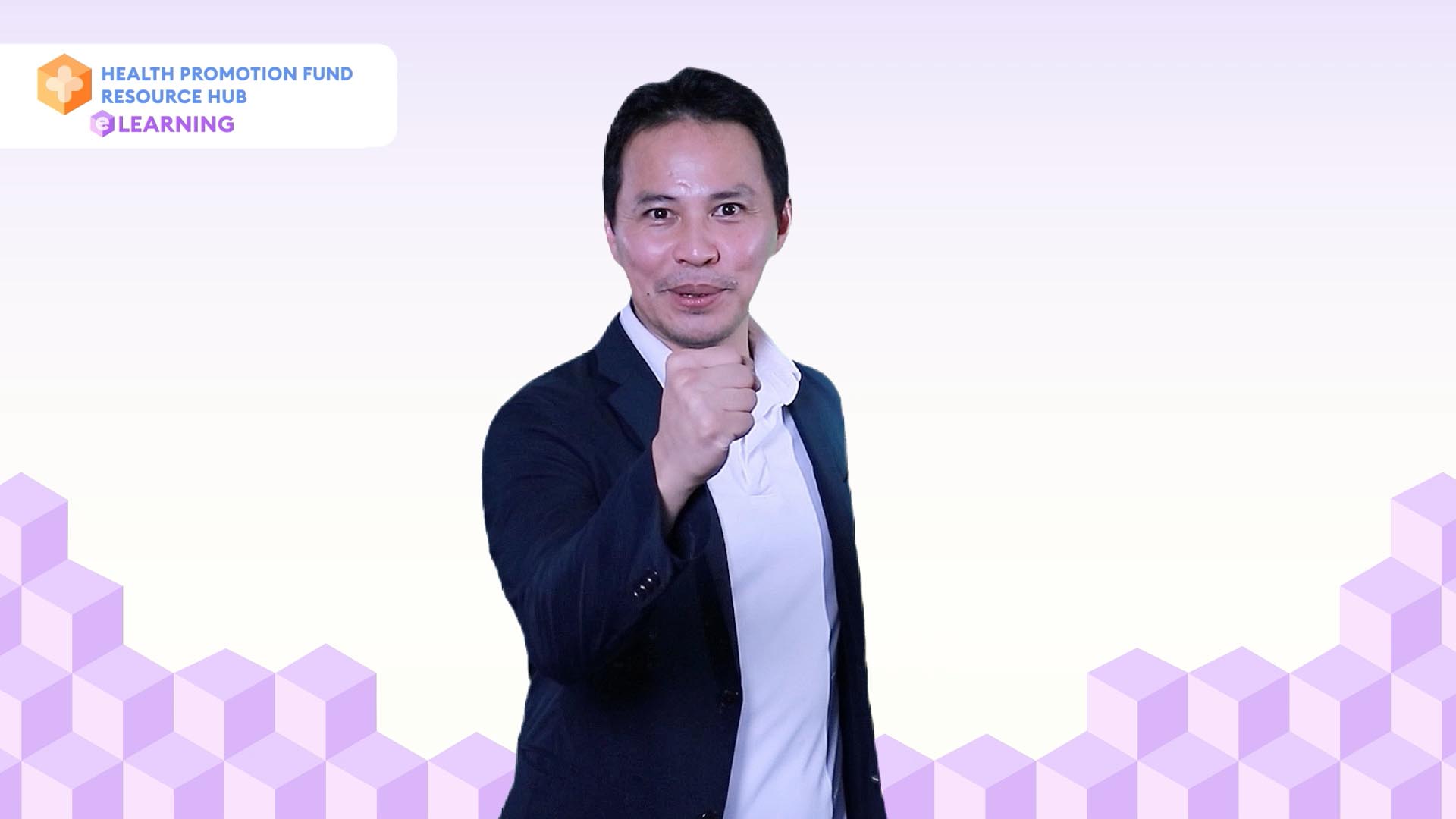3.1 ThaiHealth case study
Welcome. The speaker for this module is Mr Rungsun Munkong, International Relations Expert, Thai Health Promotion Foundation (ThaiHealth).
Choose between video, audio, or transcript to learn about this section.
Audio:
Hi everyone, my name is Rungsun Munkong and I am the International Relation Expert at Thai Health Promotion Foundation, or ThaiHealth. Today, I am going to introduce the case study of the Thai Health Promotion Foundation.
Let’s start with the problem. In the 1990s in Thailand, we faced a lot of difficulties relating to NCDs prevention. First, there was an insufficient budget and insufficient infrastructure for health promotion and NCDs prevention including tobacco control and alcohol control. Tackling NCDs was also a very complex issue. It requires a lot of strategies, and various different approaches, to improve healthy lifestyles and the environment for health promotion. 90% of NCD causes lie outside of the health sector and at that time, we faced difficulty to work across sectors - or working with other sectors - besides the health sector.
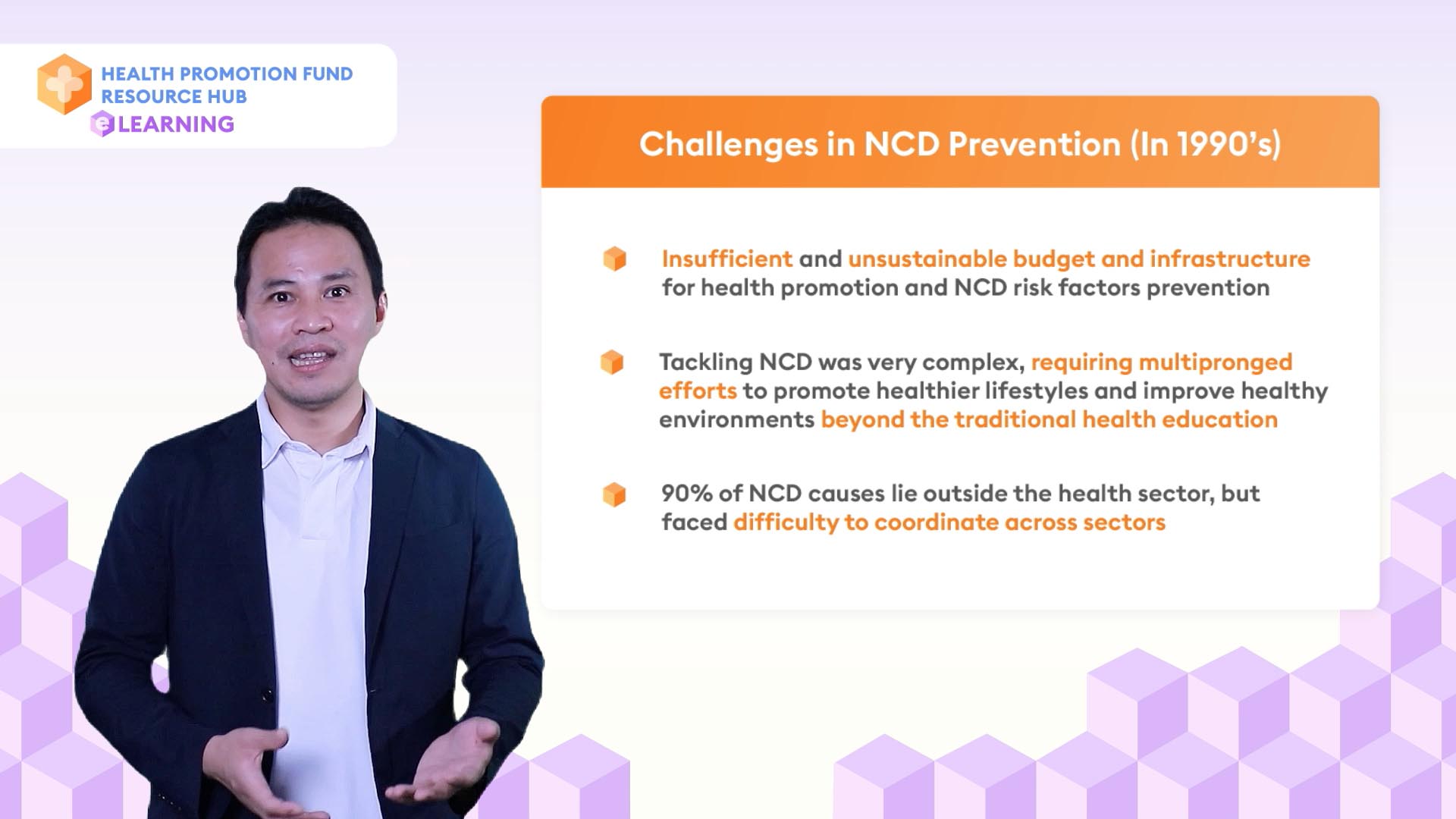
The solution that Thailand came up with is a Win-Win-Win approach of using tobacco and alcohol taxation towards health promotion. First, it helps to mobilise domestic funding for financing health promotion. Second, it helps ease the public health burden and sustainable development burden of the country, and third, increasing tax is a best buy and effective intervention to prevent initiation of tobacco use and alcohol use for the young generation.
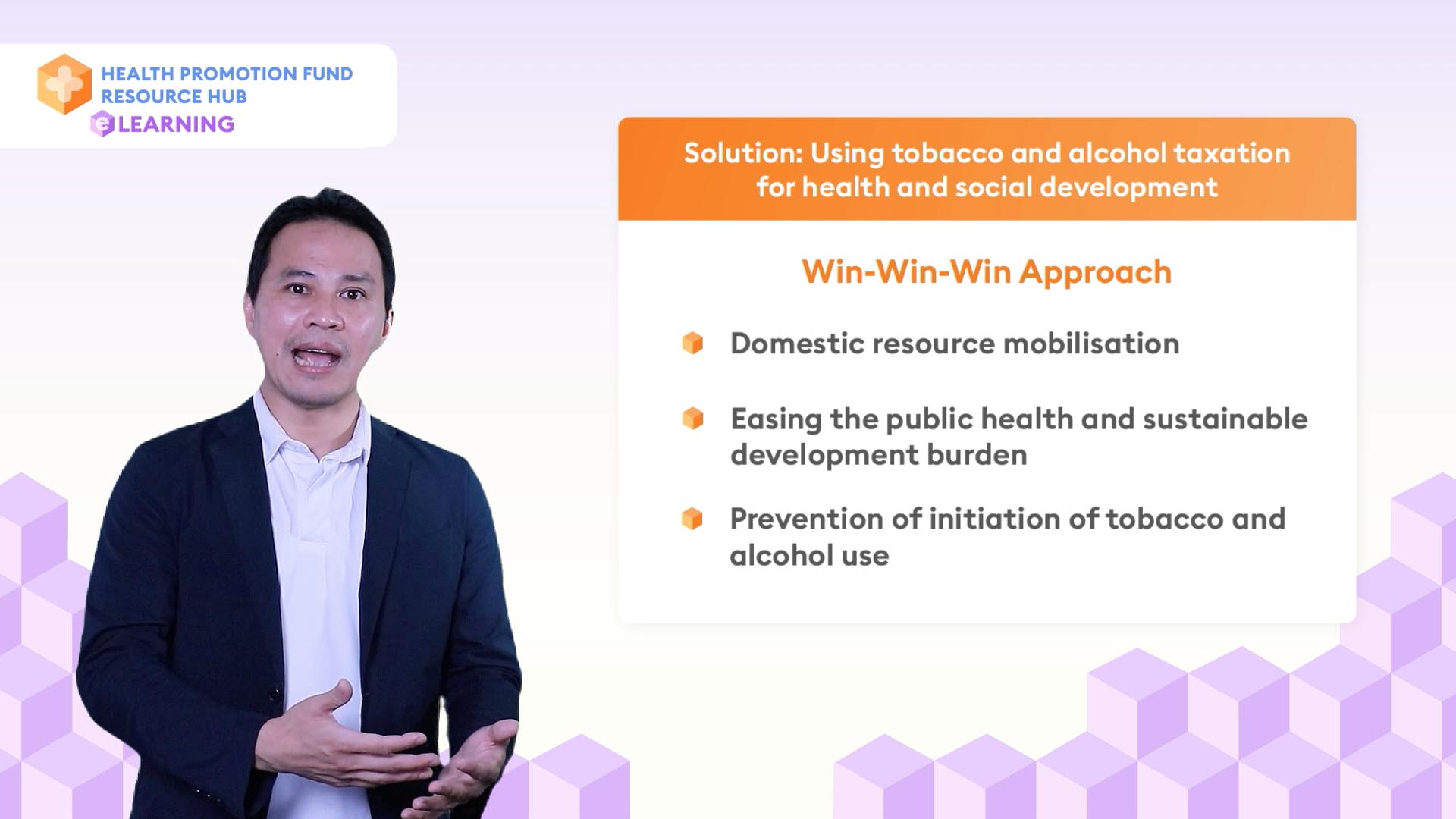
And that led to the set up of the ThaiHealth Promotion Foundation or ThaiHealth, which was set up as an ‘autonomous government agency’ under the Health Promotion Act of 2001. It receives dedicated income (revenue) from the taxation on tobacco and alcohol, which is an innovative financing mechanism for health promotion.
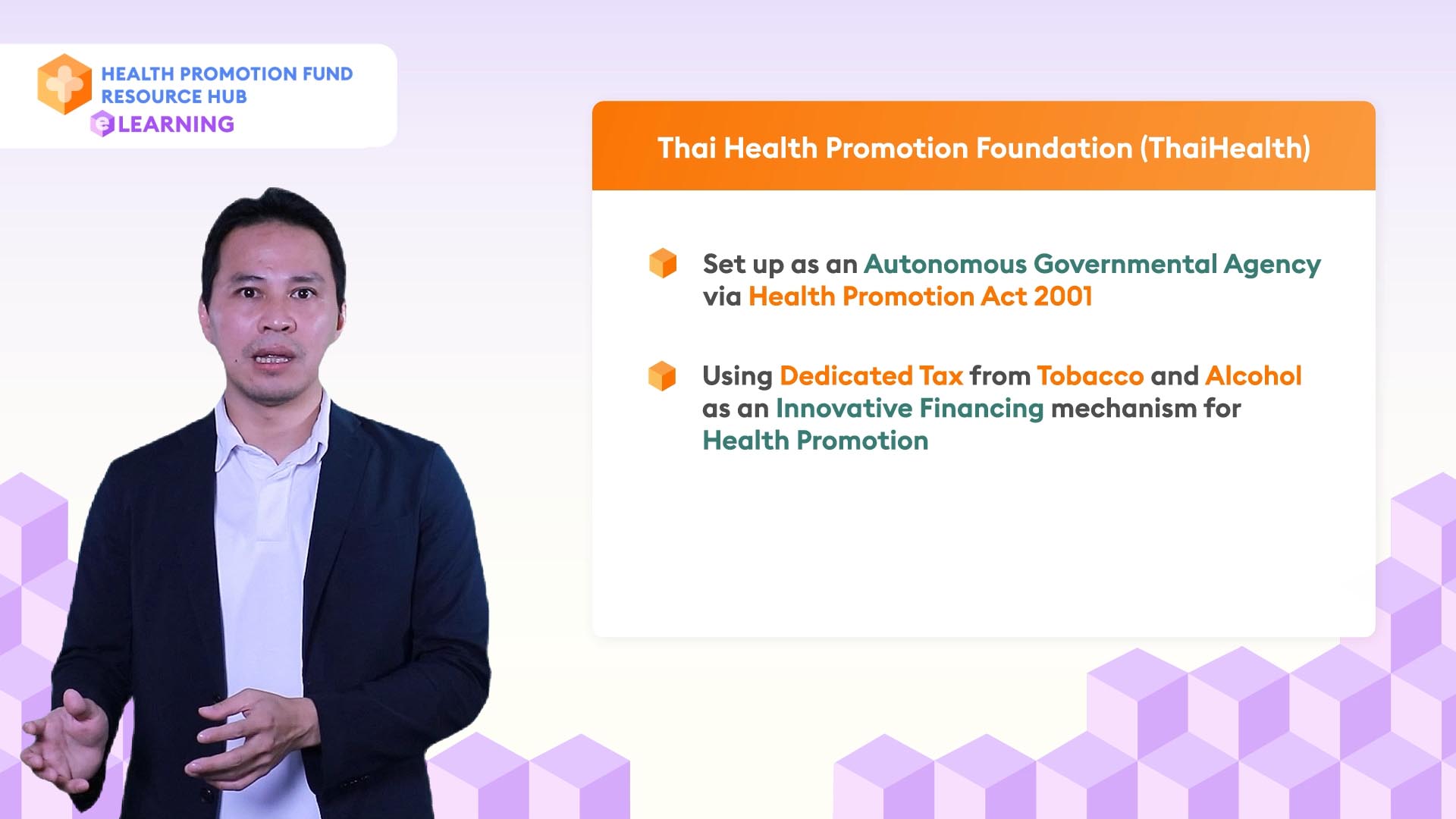
The funding is used to provide catalytic grants and strategic coordination to multi-sectoral partners towards promoting healthy lifestyles and improving healthy environments.
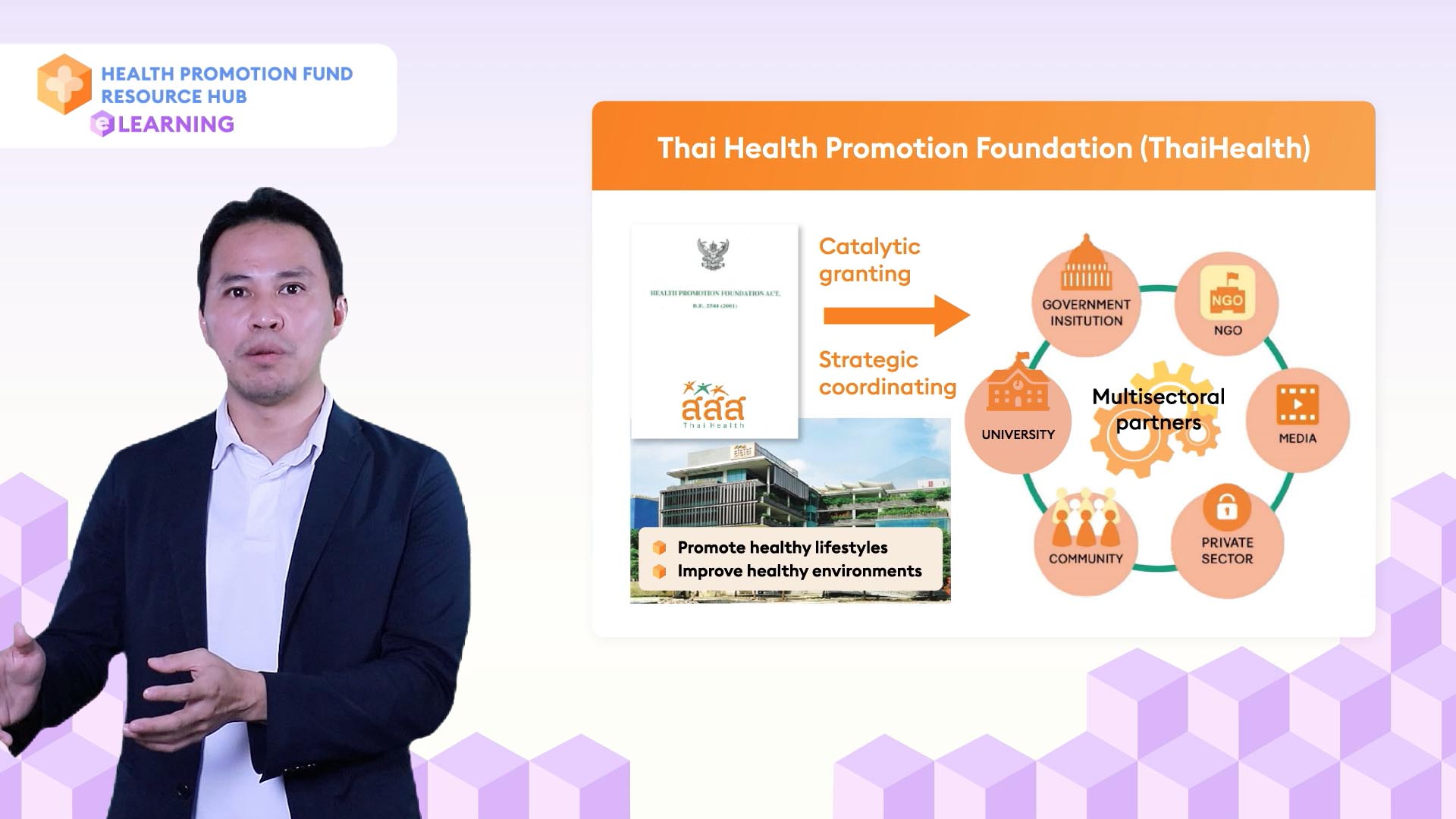
ThaiHealth is administered by the board of governance, chaired by the Prime Minister of Thailand, and comprise of multi-sectoral members.
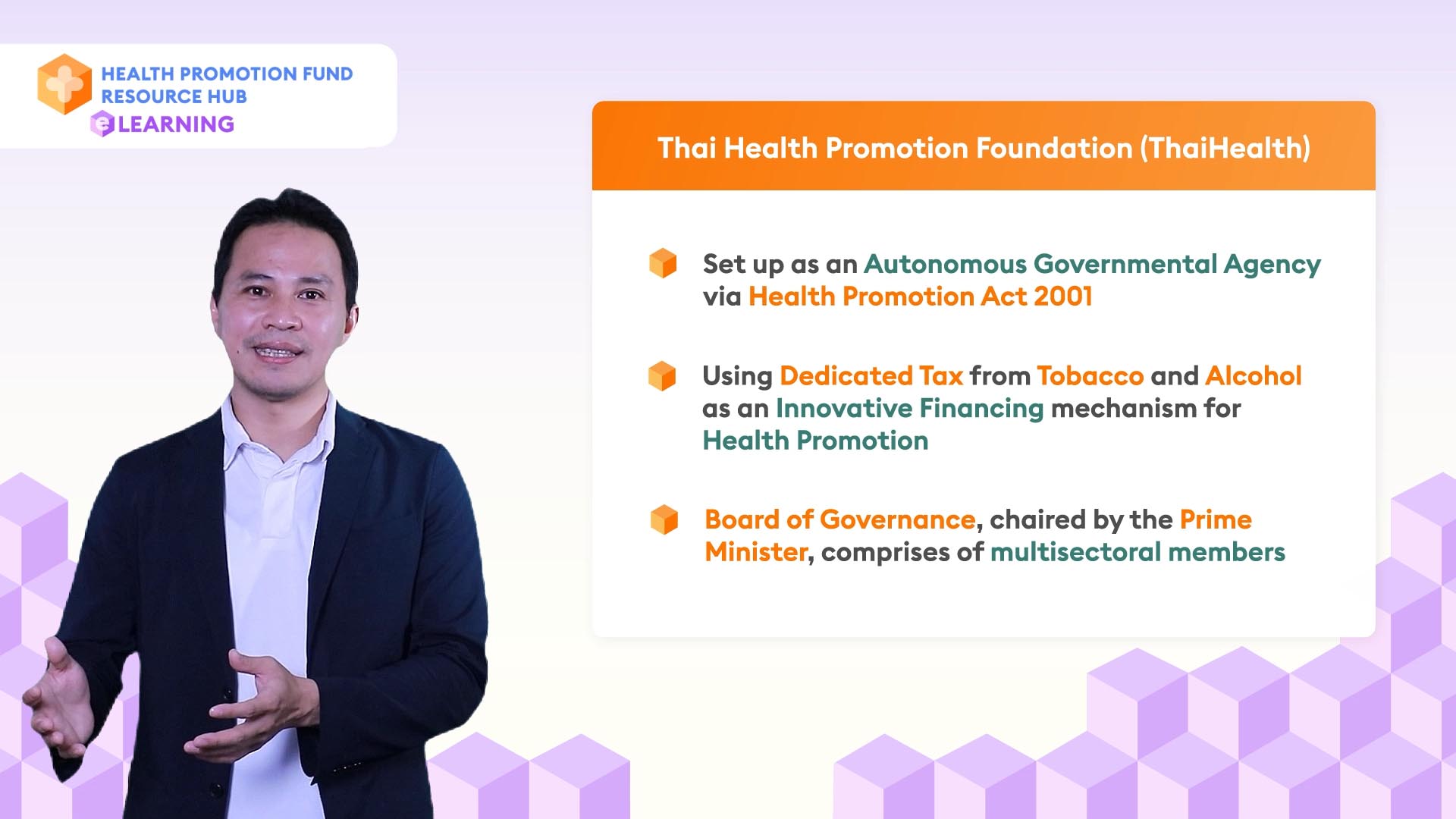
The board of governance of ThaiHealth comprises 21 members. The Prime Minister is the chairman of the board. The Minister of Public Health is the 1st vice-chairman, and the independent expert is the 2nd vice-chairman. The board of governance comprises nine (9) members who come from related ministries and the other nine (9) from independent experts in various disciplines. The CEO serves as the secretary of the board and overall, the board of governance supervises the operation and policies of the ThaiHealth Office.
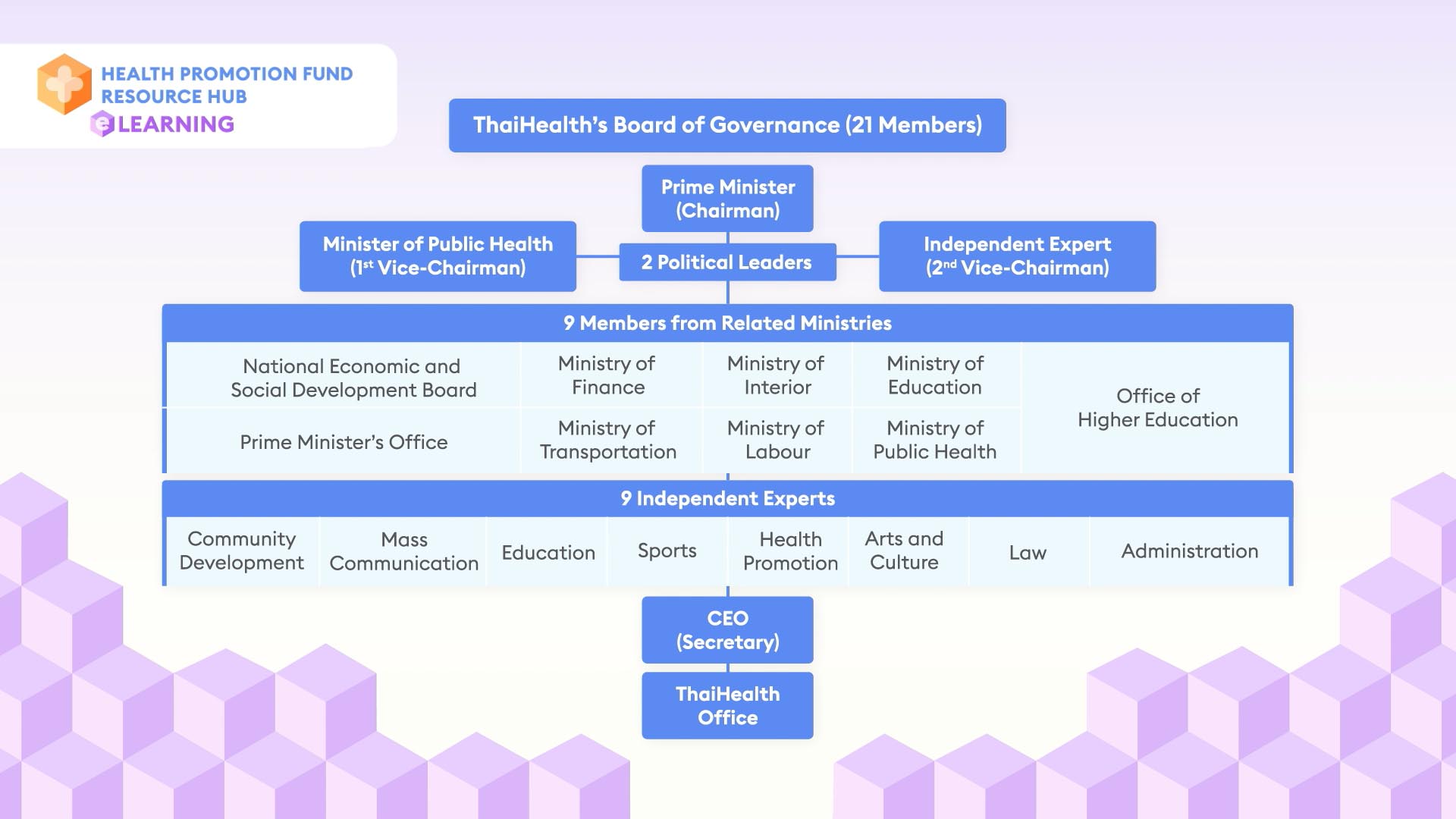
The source of funding for ThaiHealth is considered an innovative and sustainable funding mechanism, which comes from a 2% surcharge tax on tobacco and alcohol products, which amounts to around USD 130 million per year between 2010-2021.
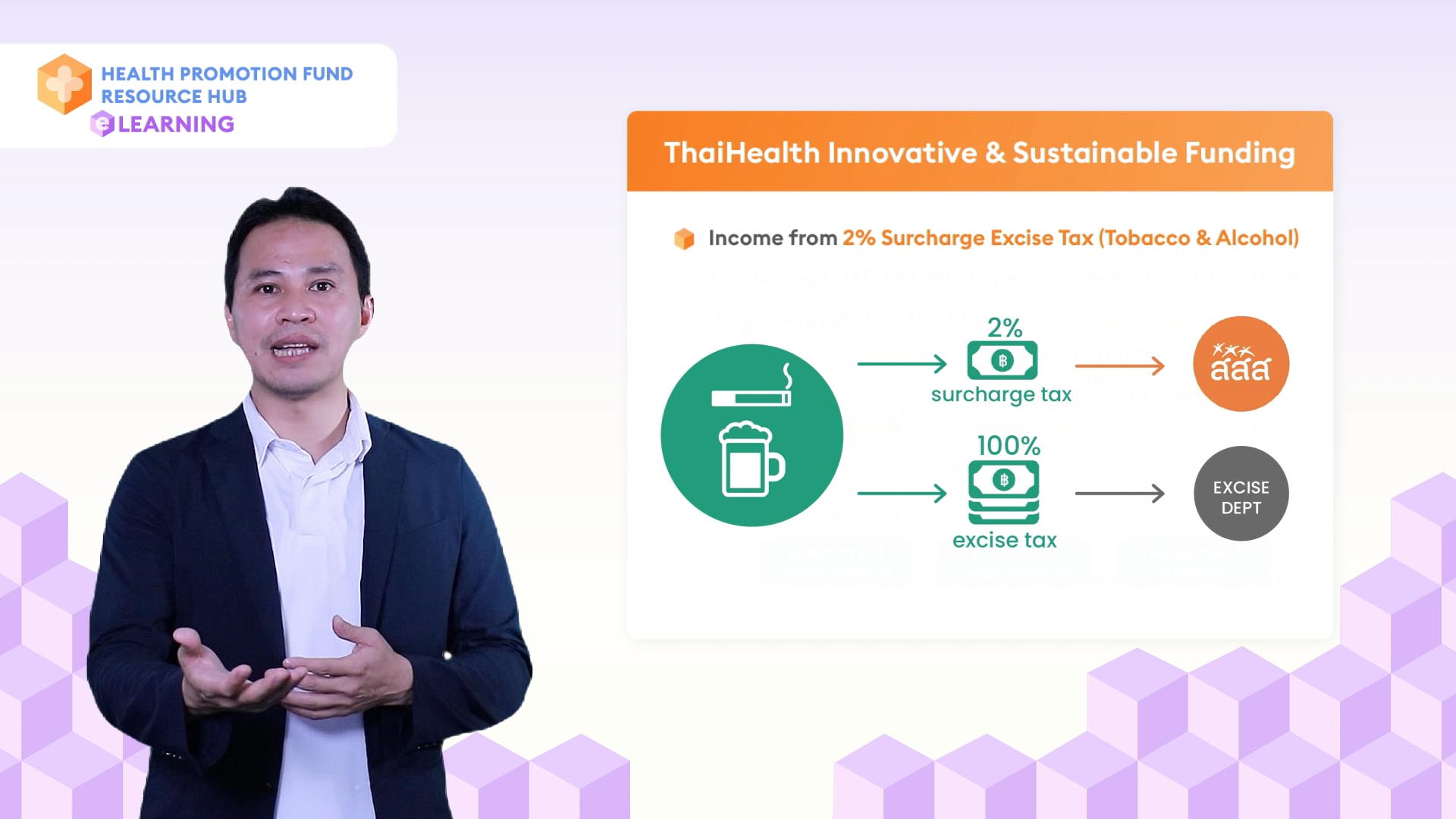
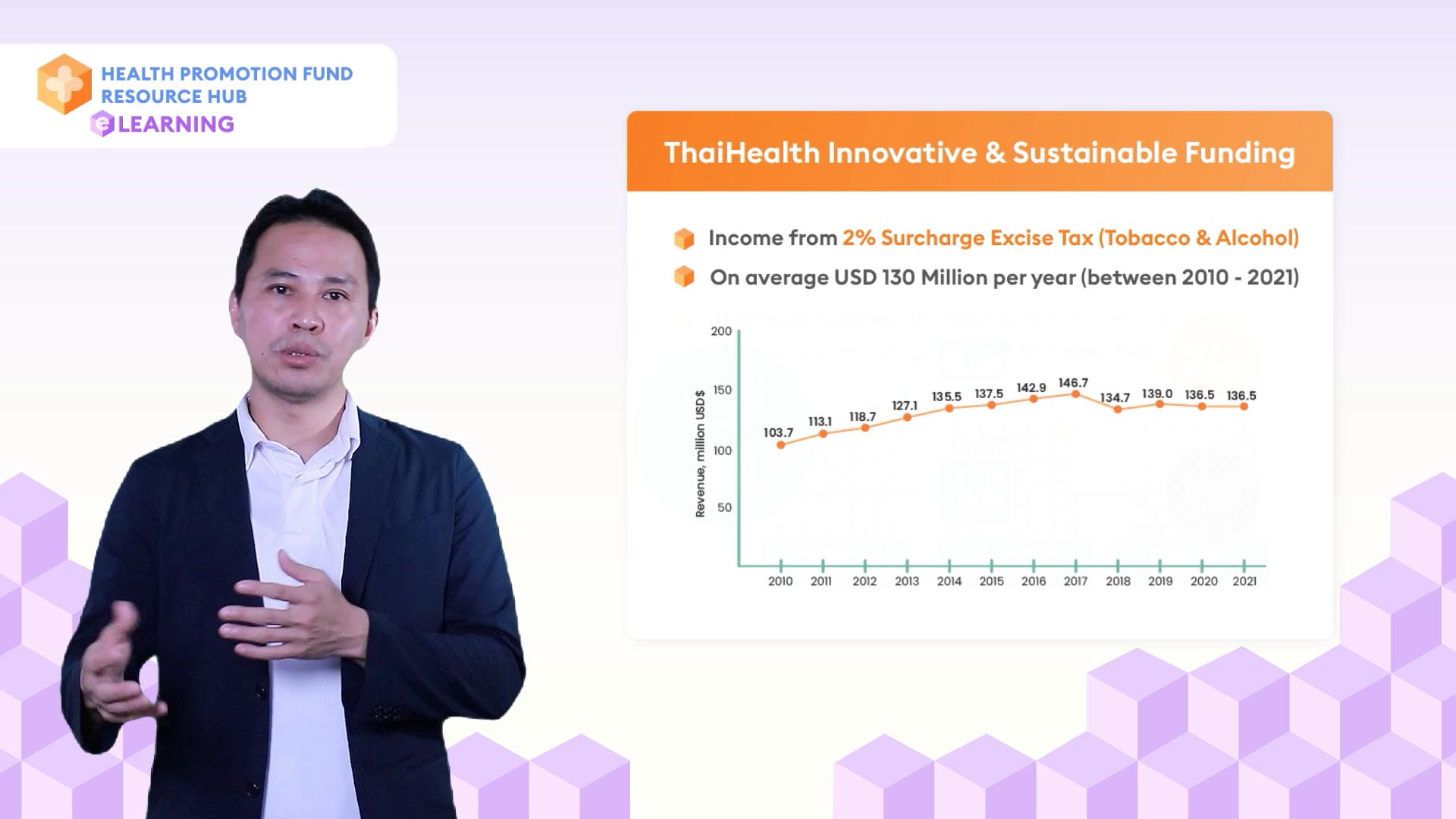
This amount of money may seem a lot but it is only a small fraction of the Ministry of Health’s budget or the National Health expenditure. That is why ThaiHealth wants to use this funding in a different way as a catalyst or lubricant to fill in the gaps of systematic funding instead of using it as a main fuel for all the health services.
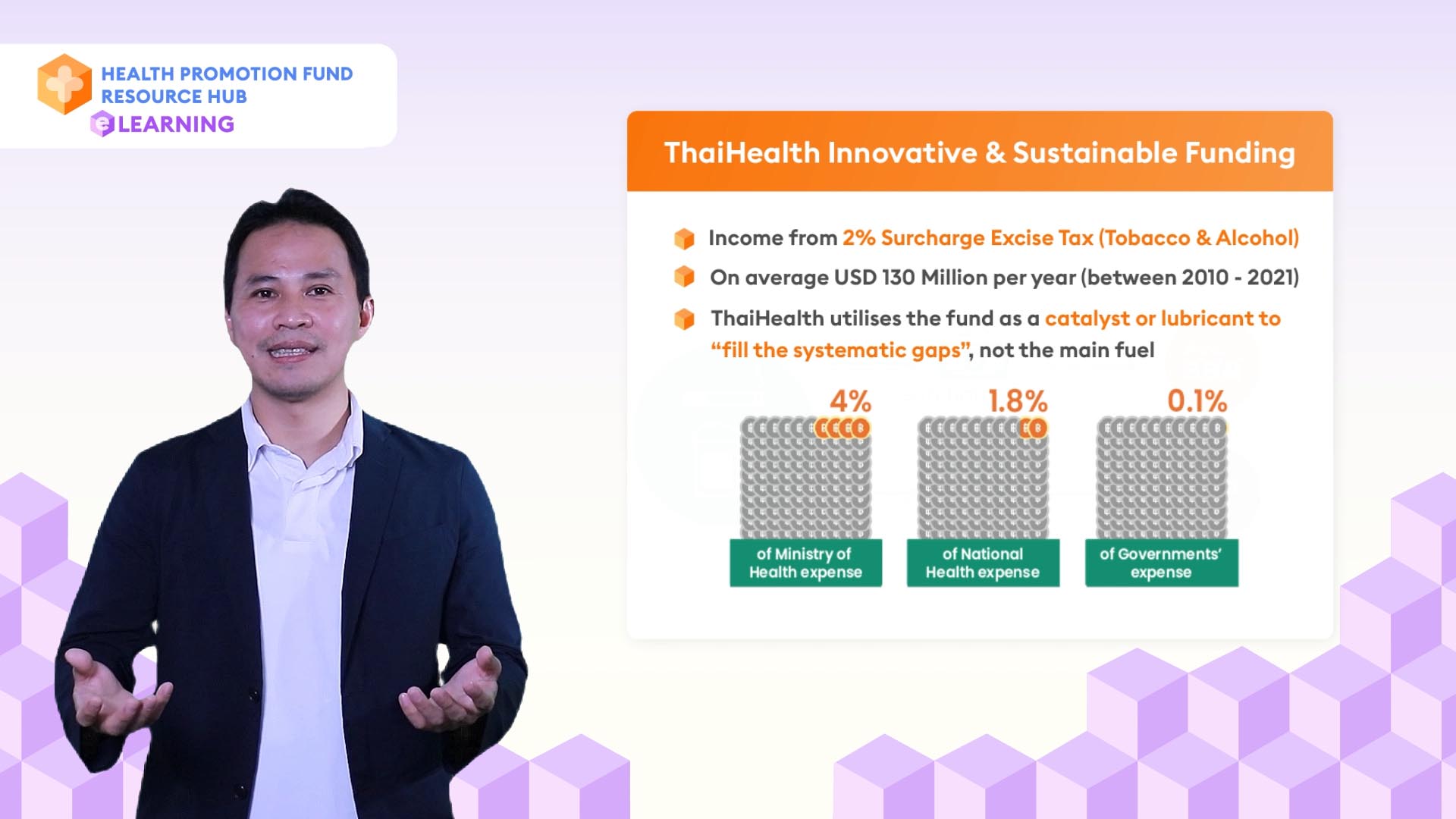
For the next ten years, ThaiHealth aims at promoting good health and well-being for our people. Our strategic priority areas include tobacco control, alcohol control, healthy diet, physical activity promotion, road safety, mental health promotion, environmental health, and emerging health issues and other risk factors.
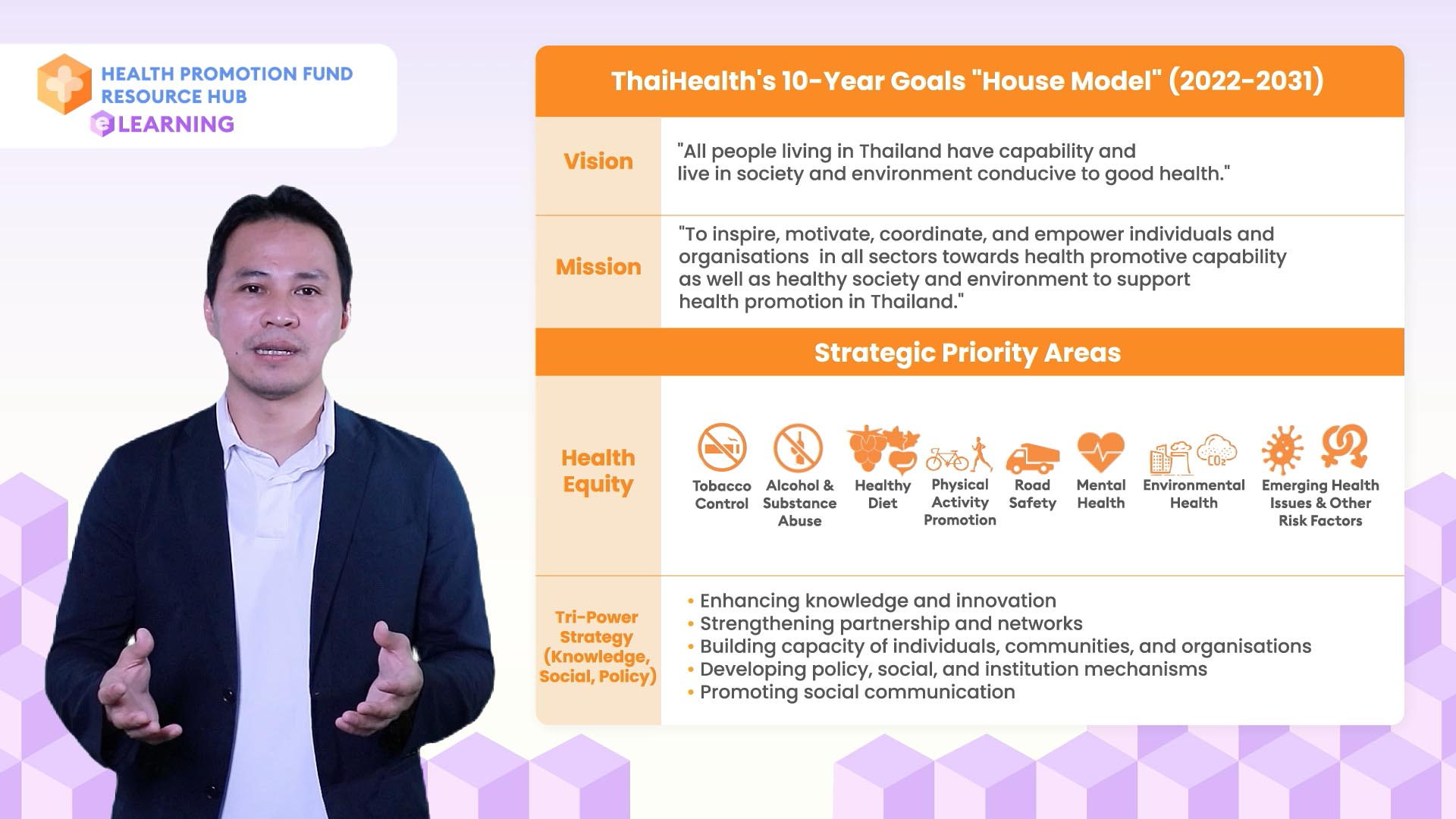
In our work, we use a multi-sectoral approach where we work with all the sectors in society, including government institutions, NGOs, universities, the media, the community themselves, or the private sector. On average, we grant about 3,000 projects a year of various sizes, and overall, over 20,000 partners from all sectors of society are joining with ThaiHealth to promote health and well-being.
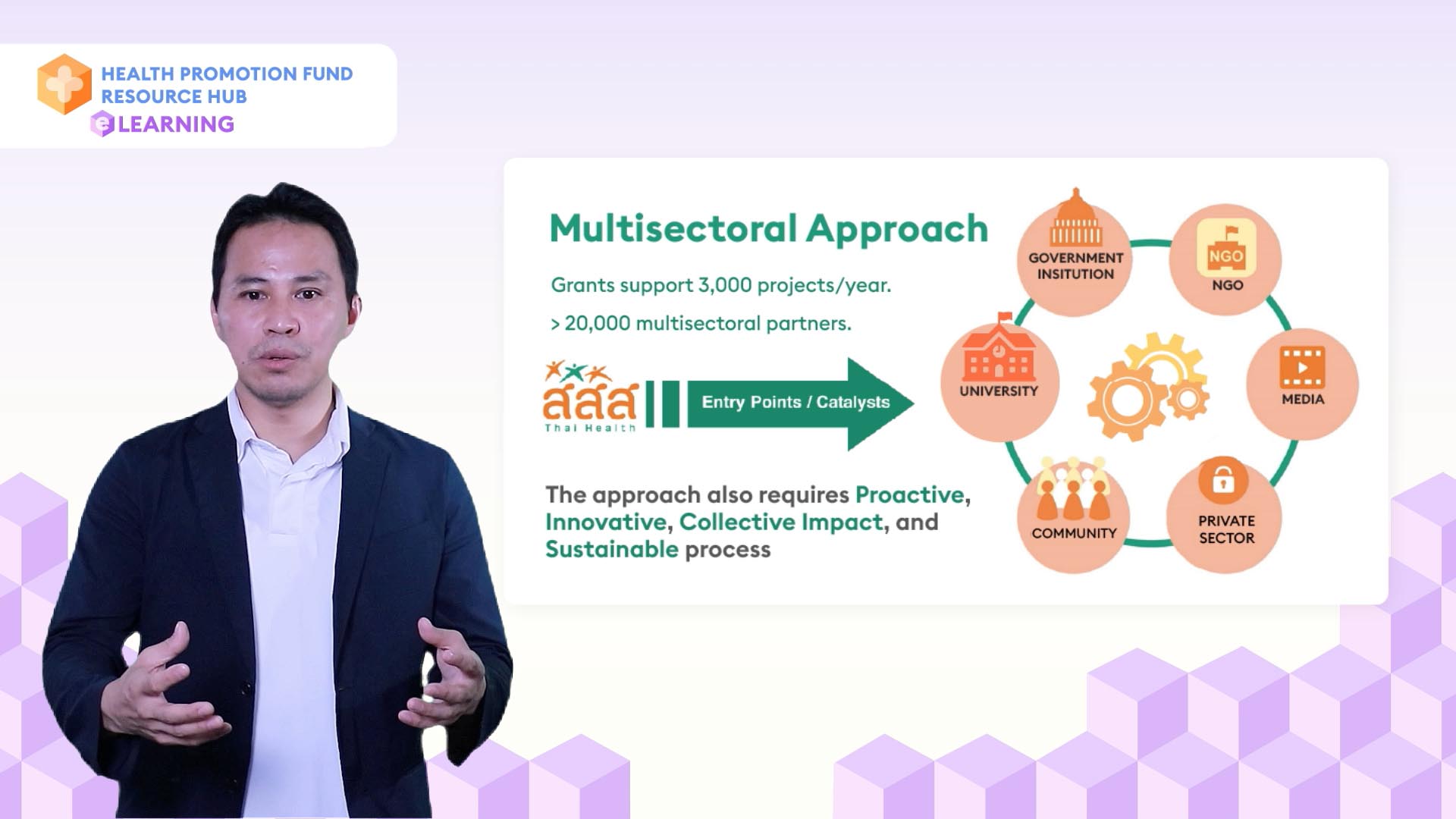
On the funding strategy of ThaiHealth, over 90% goes towards proactive grants where we aim for big changes and outcomes in society, and less than 10% is open grants to all the people in Thailand to apply for small grants to improve the health of their own community. Most of the funding goes towards tobacco control, alcohol control, community health, and other major risk factors promotion.
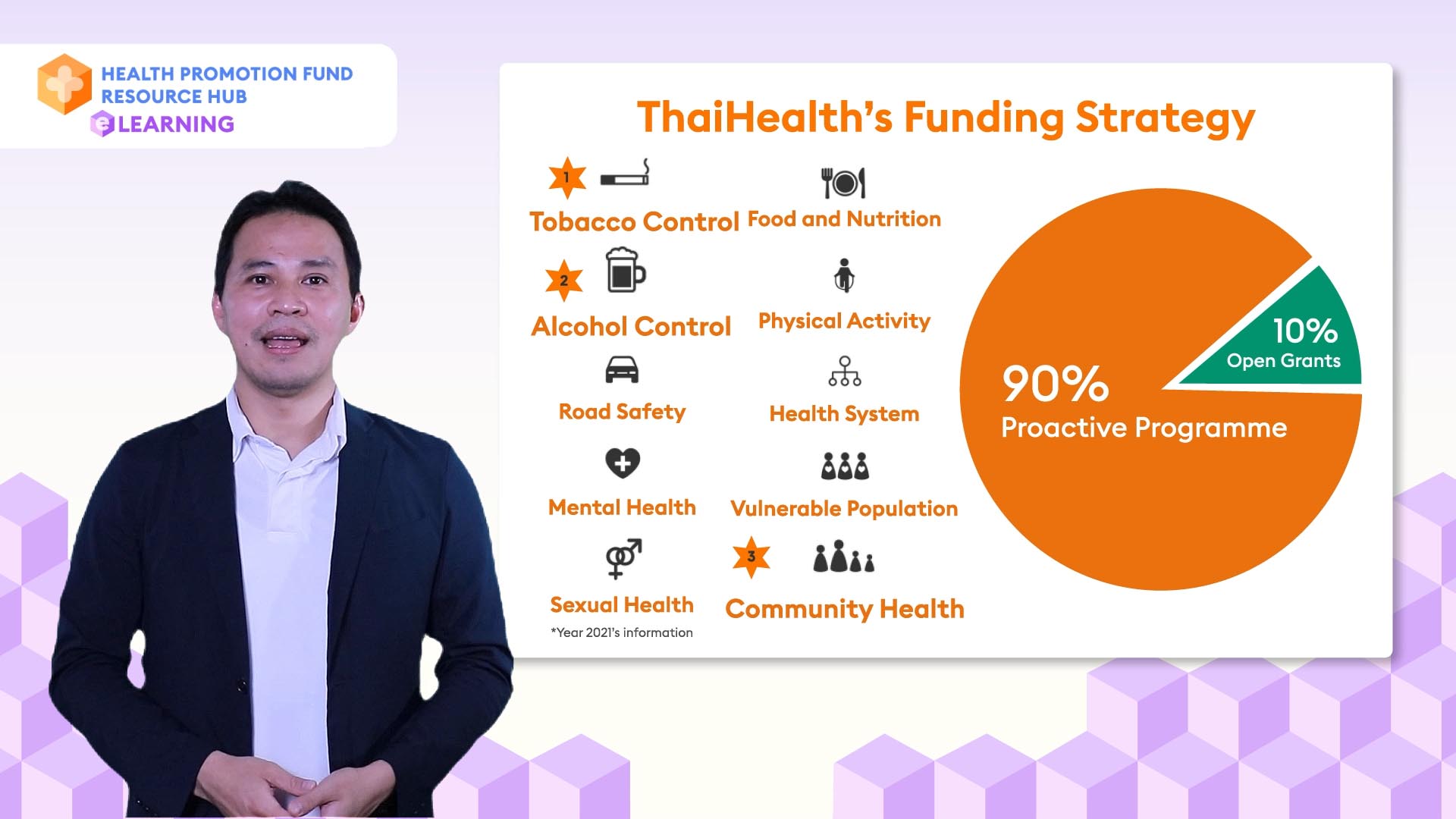
The power that we use to drive our operation is called the Tri-Power strategy or the ‘Triangle that Moves the Mountain’ whereas the mountain compares to the difficult health promotion issue that we tried to overcome. The first angle (strategy) is the knowledge and research generation to generate the evidence needed to resolve the issues. The second strategy is the social mobilisation through on-the-air and on-the-ground to mobilise the society towards awareness of the issues, and the last strategy is called policy advocacy and policy enforcement to make that change lasting for society.
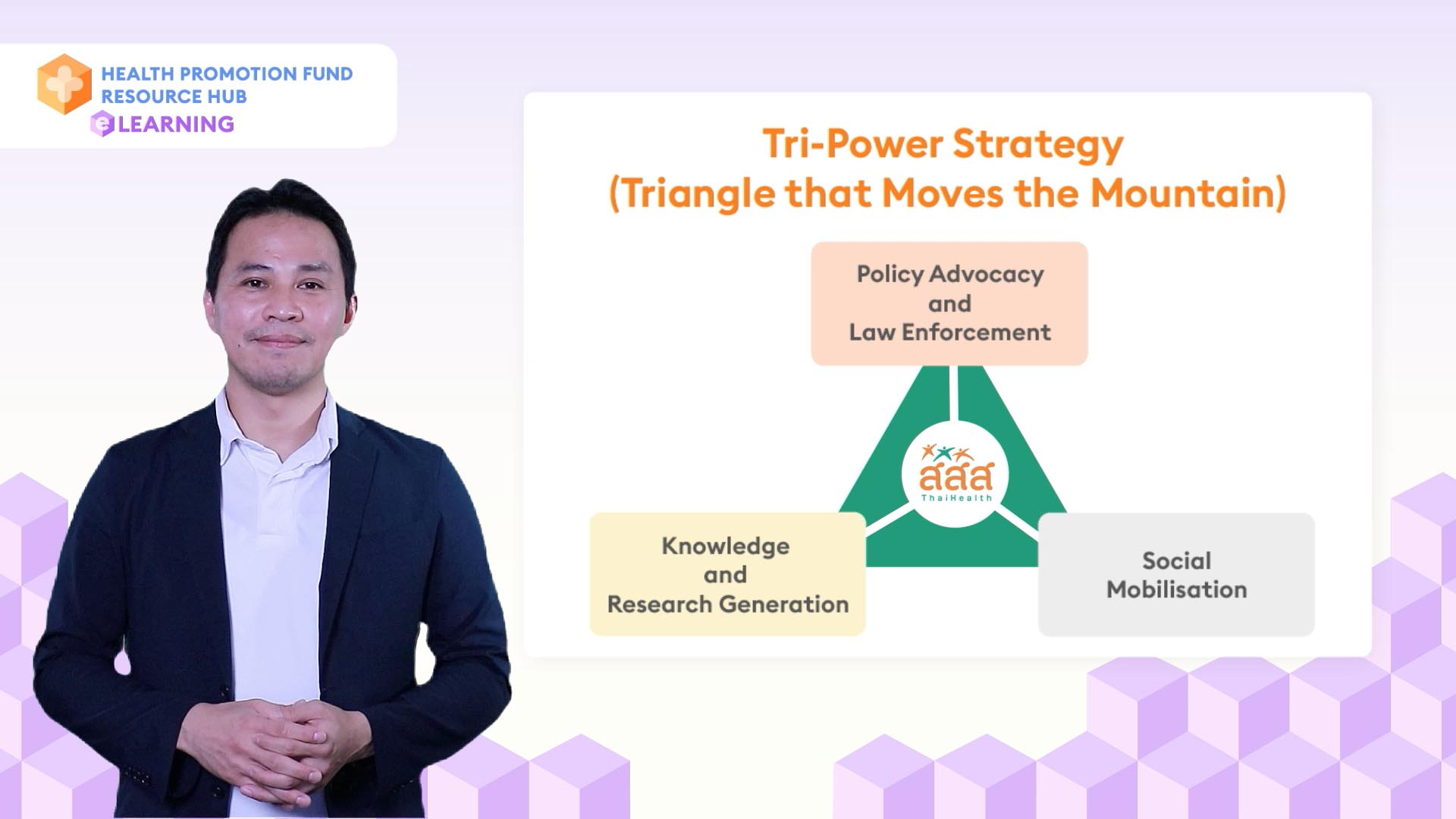
These are some of the examples of the knowledge and research generation strategy.
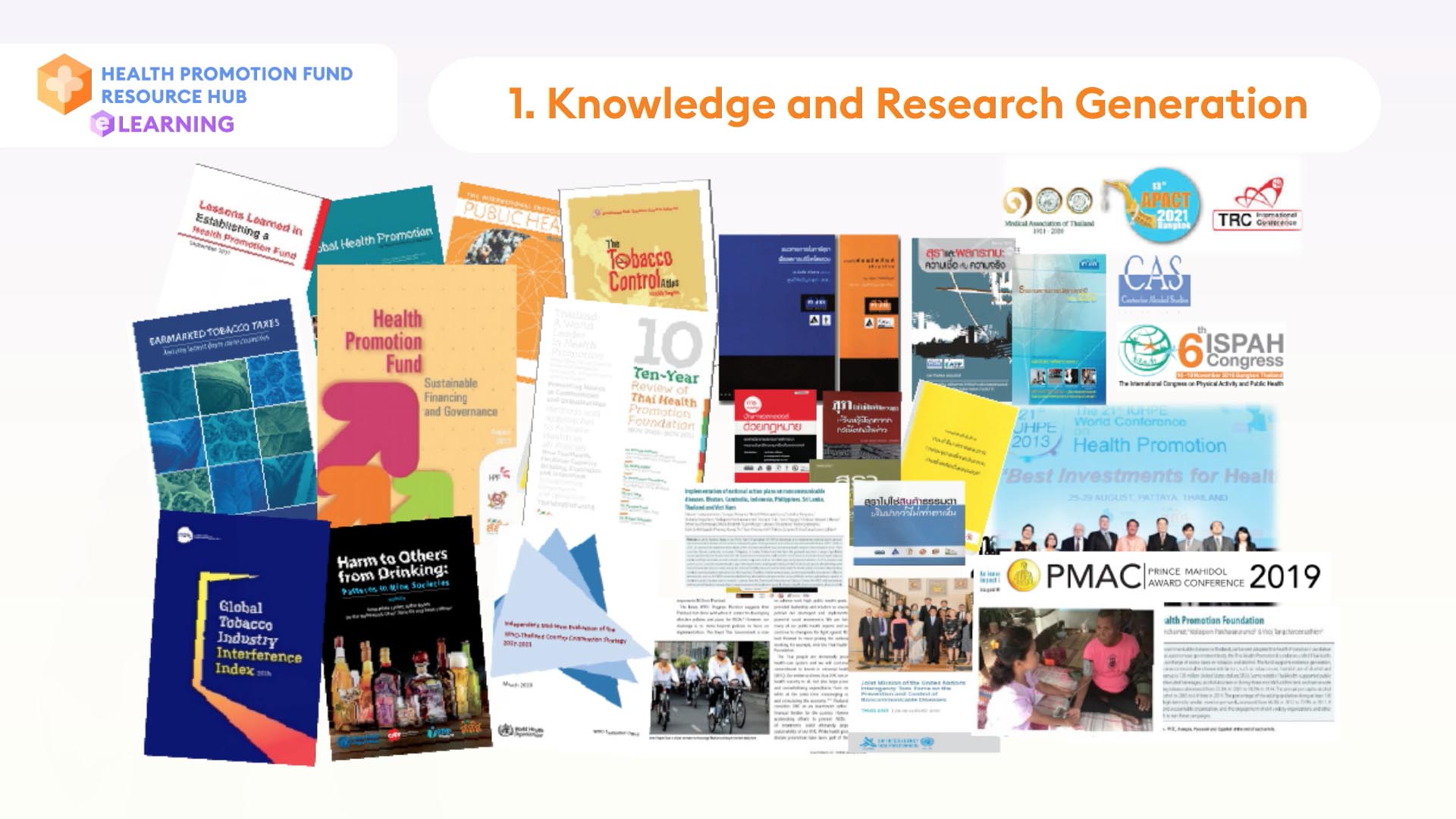
And here are some of our examples of social mobilisation strategy, which include both on-the-ground activities, such as sporting events, promotion, or community activities; and on-the-air activities, which include social marketing media campaigns on various issues.
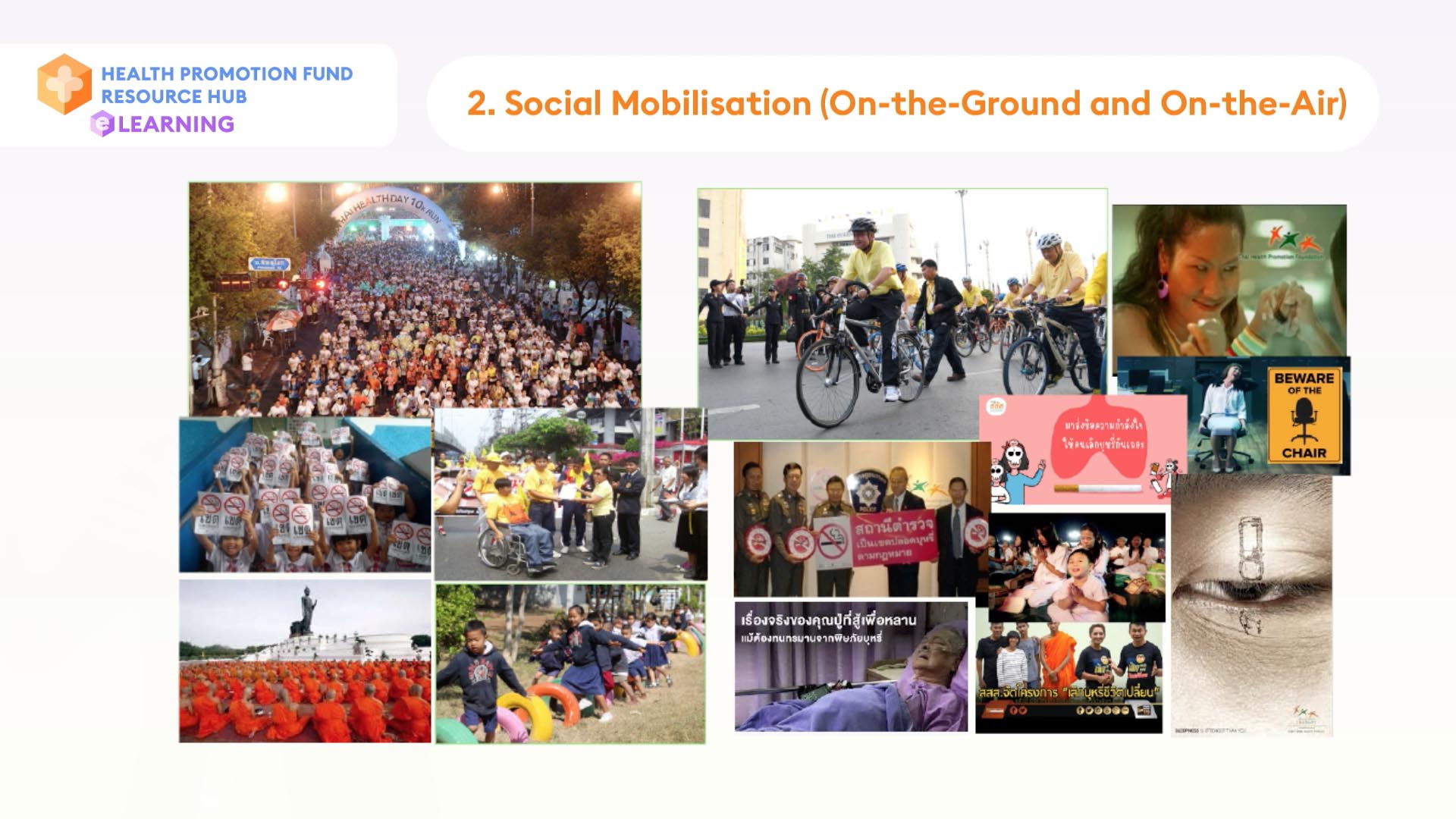
Sustainable change often comes from the first strategy of policy advocacy and law enforcement. When the window of opportunity opens, we advocate for good policy on health promotion and good policy would be effective if it is enforced by related responsible agencies and we work with them to make sure that happens.
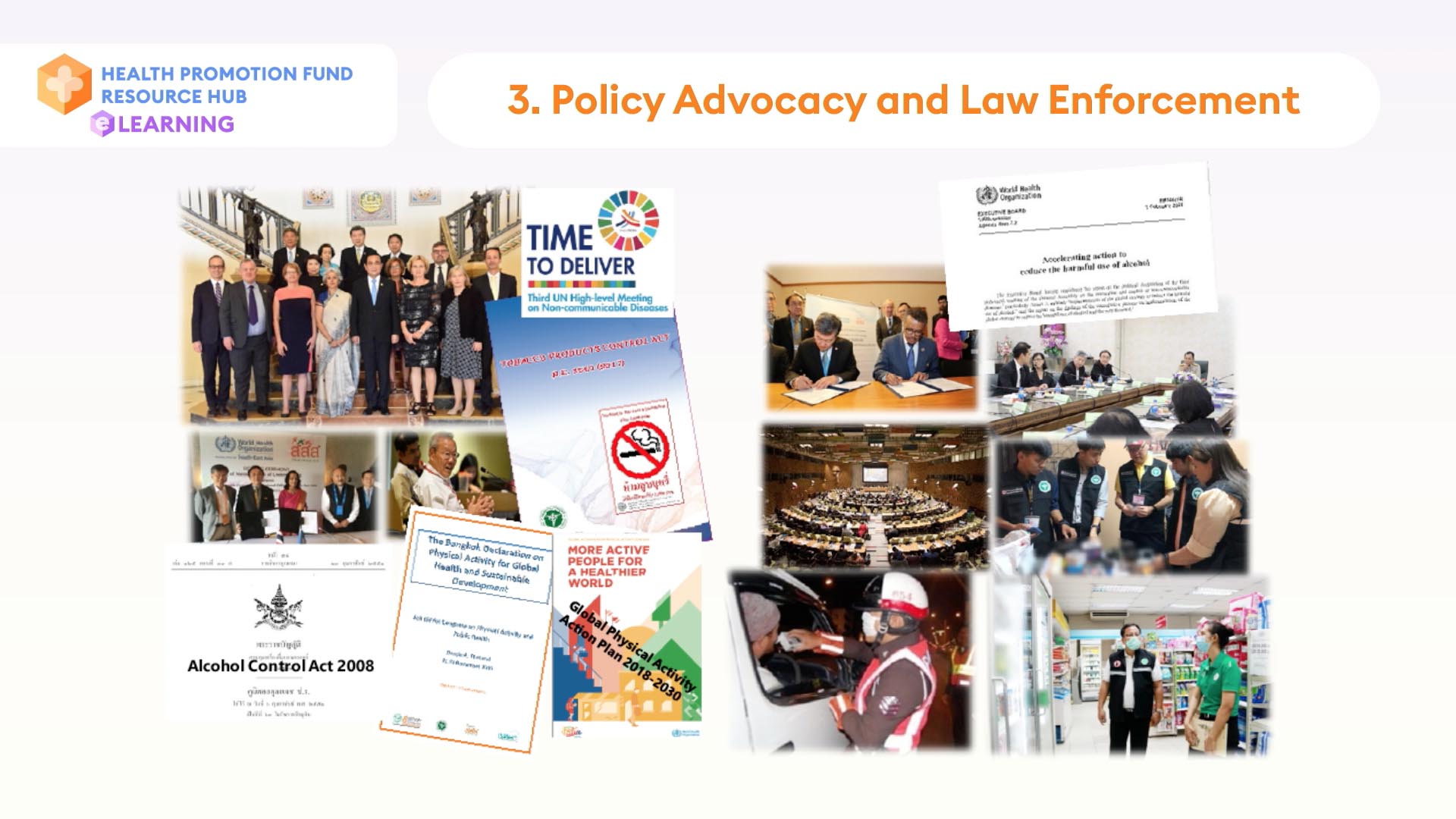
This is the example of ThaiHealth’s triangle strategy on tobacco control. From the knowledge angle, we set up the Tobacco Research and Knowledge Management Center (TRC) to generate needed evidence to drive key policies on tobacco control. On social mobilsation, ThaiHealth works with many NGOs, as well as the media to promote non-smoking and to denormalise tobacco industry in Thailand. And on the policy advocacy and law enforcement angle, we do work with the National Committee on Tobacco Control and the Ministry of Public Health to drive important good policies on tobacco control and to enforce the ones that have been enacted before.
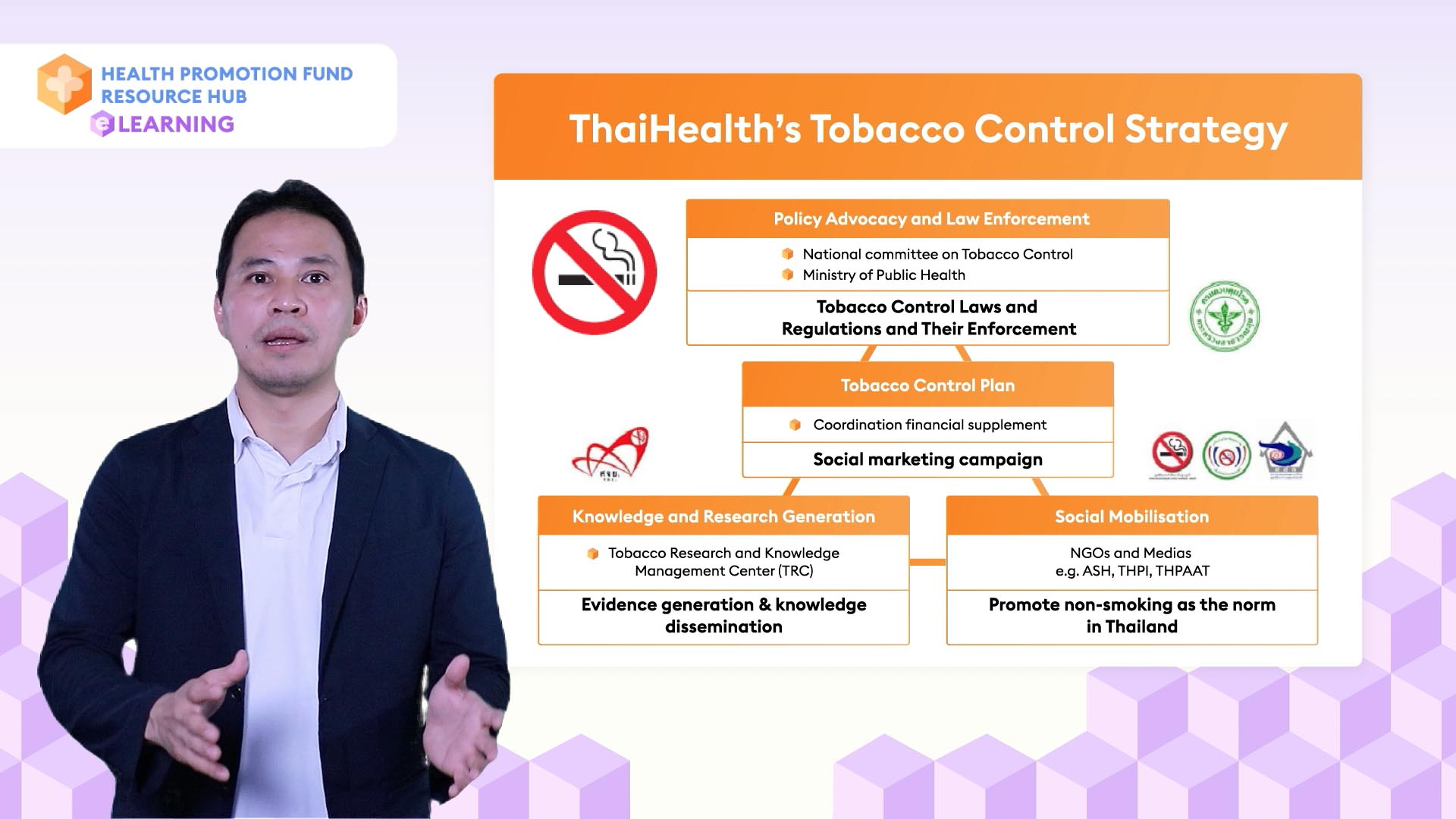
An important health outcome which is the result of the work of ThaiHealth together with our multi-sectoral partners, tobacco smoking prevalence in Thailand in 1991, started at 32% smoking prevalence. ThaiHealth started in 2001, at that point, the smoking prevalence was 25% and it continuously dropped since then to about 17.4% in the recent survey in 2021. It is the first time that the current number of smokers dropped below 10 million persons.
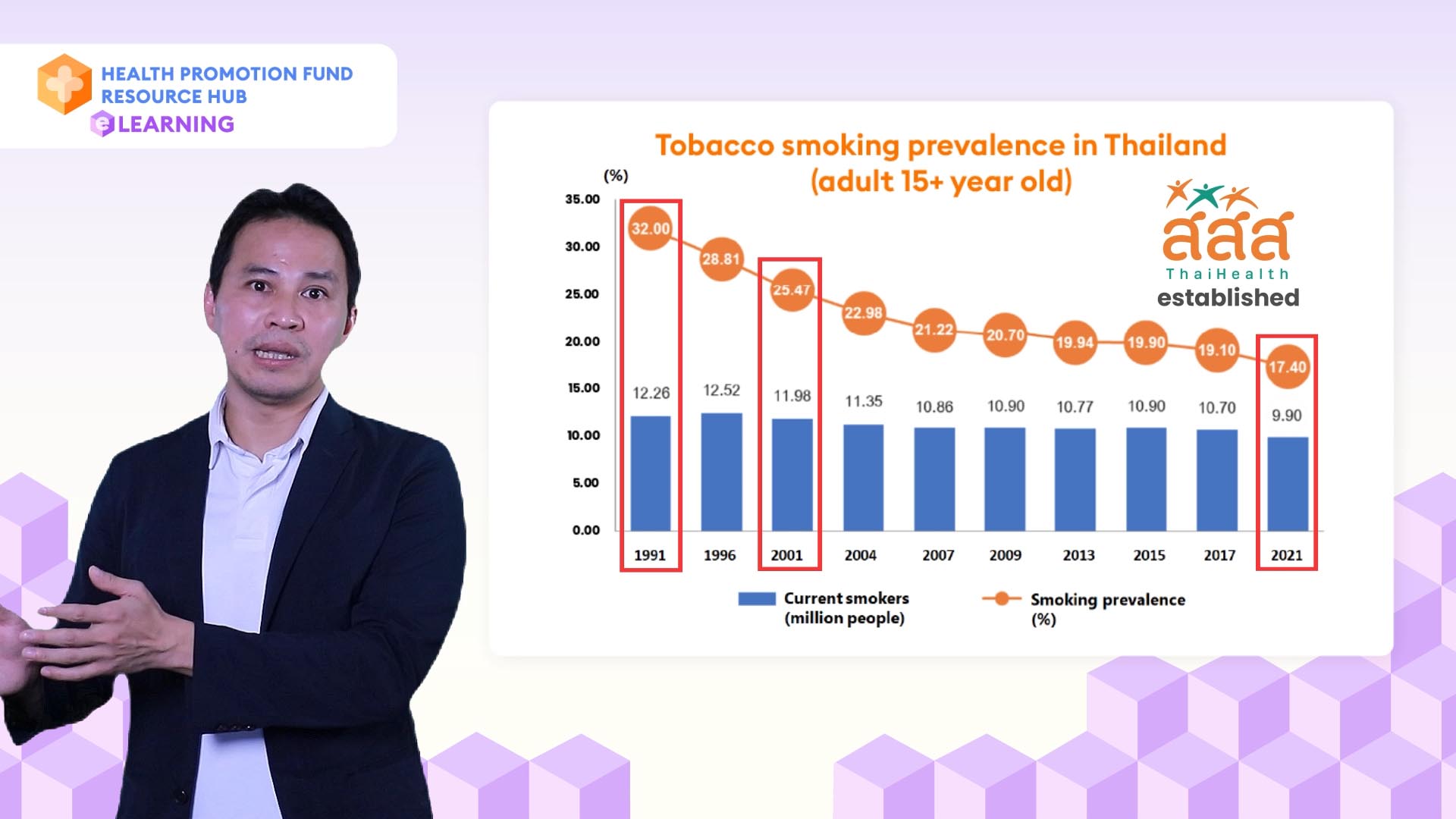
Likewise, the health outcome of alcohol control, the percentage of Thai population consuming alcohol at a harmful level has dropped from 9.1% in 2003-2004 to 3.4% in 2013-2014, which is the same for both genders.
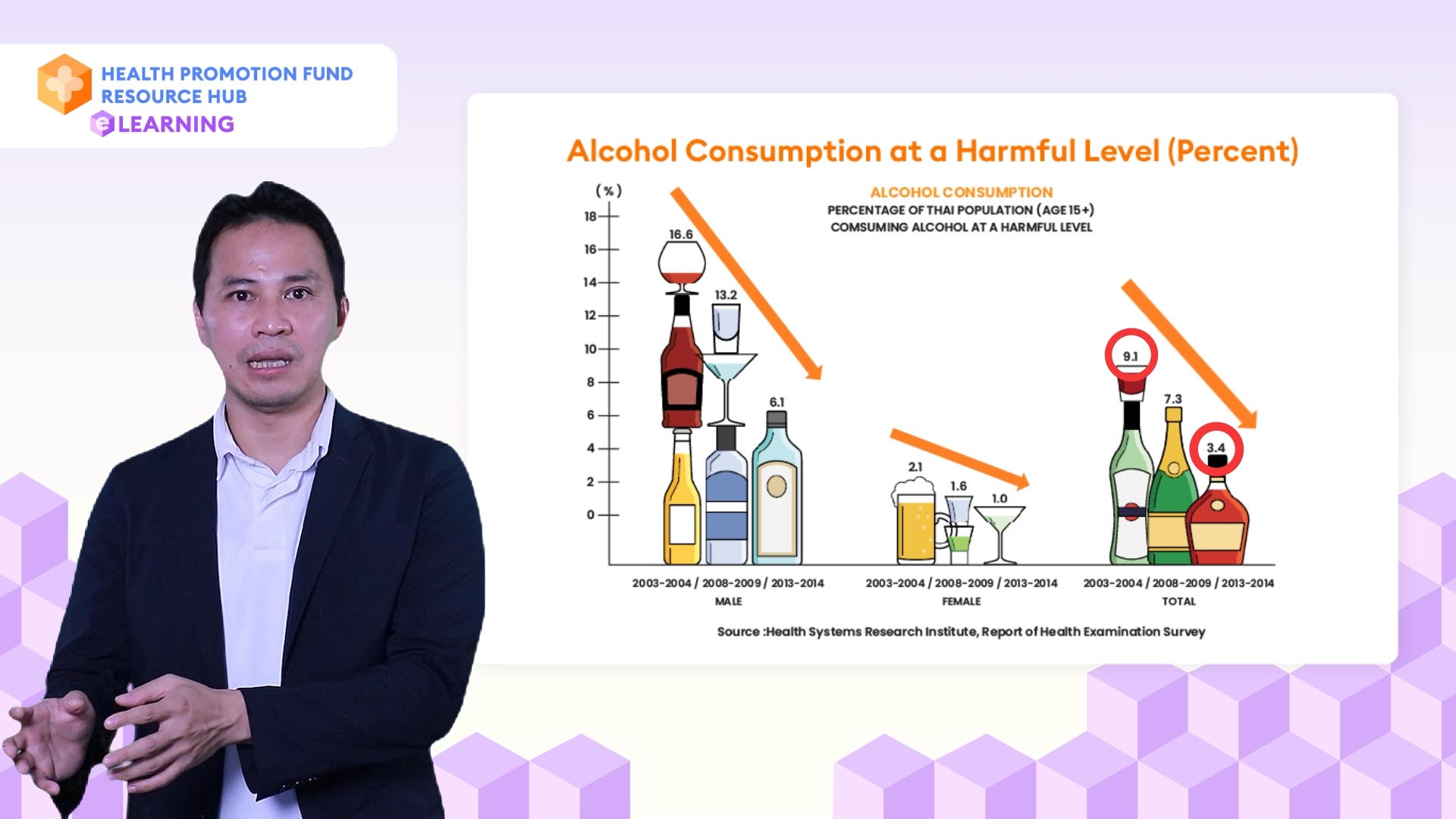
And on our work on road safety, the number of deaths by road accidents has dropped from 22,000 people in 2011 down to less than 17,000 people in 2021.
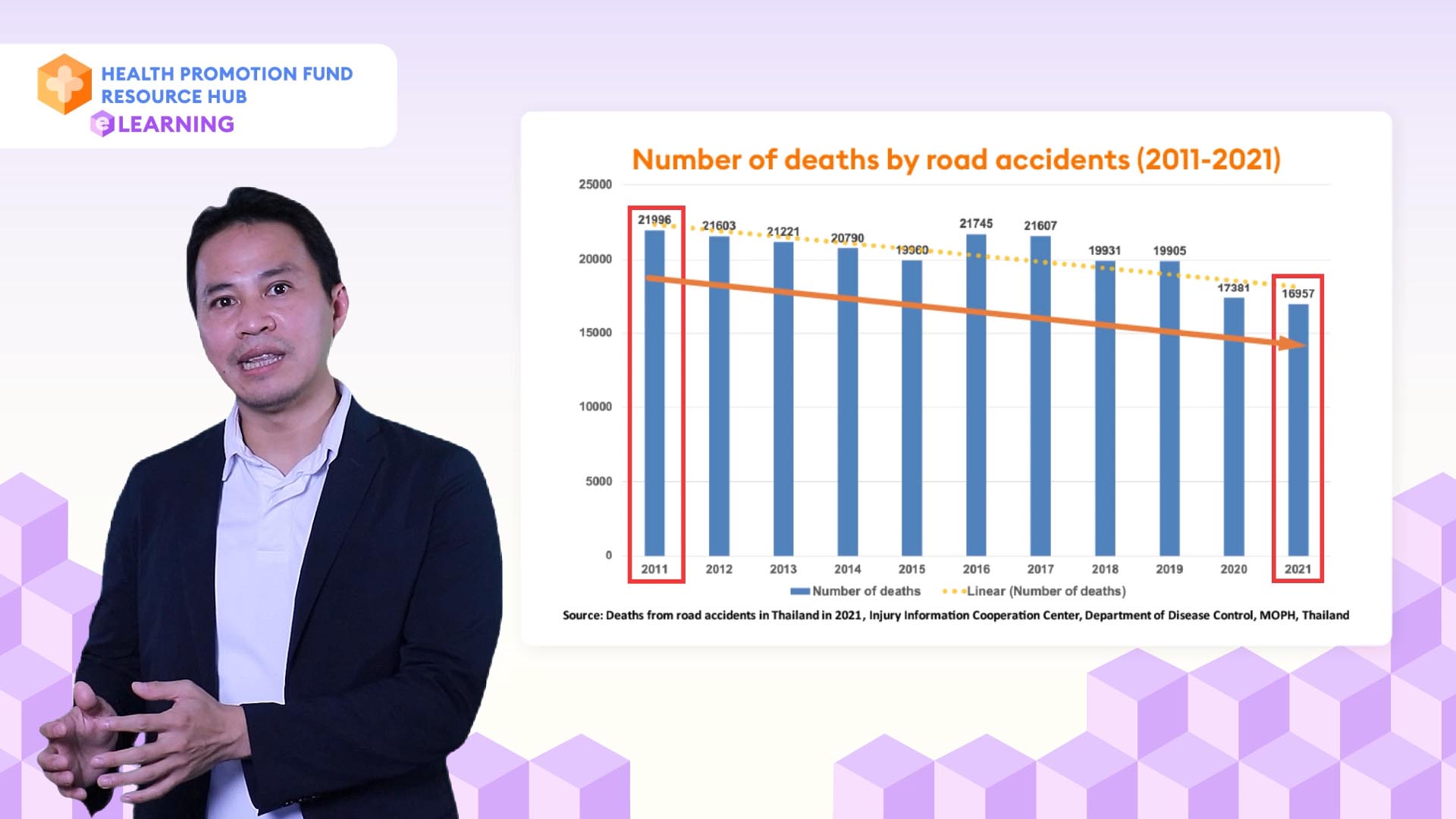
On physical activity promotion, the number of runners for health in Thailand has increased from 5 million people in 2012 to over 15 million people in 2017, although the number has since dropped due to covid-19 restrictions, and we have to start working on promoting PA (physical activity) again to get the number back up to pre-covid-19 period.

Overall NCDs monitor progress according to the WHO Global NCD Progress Monitor Report 2022, Thailand has fully achieved 13 out of 19 targets and partially achieved 6 targets.
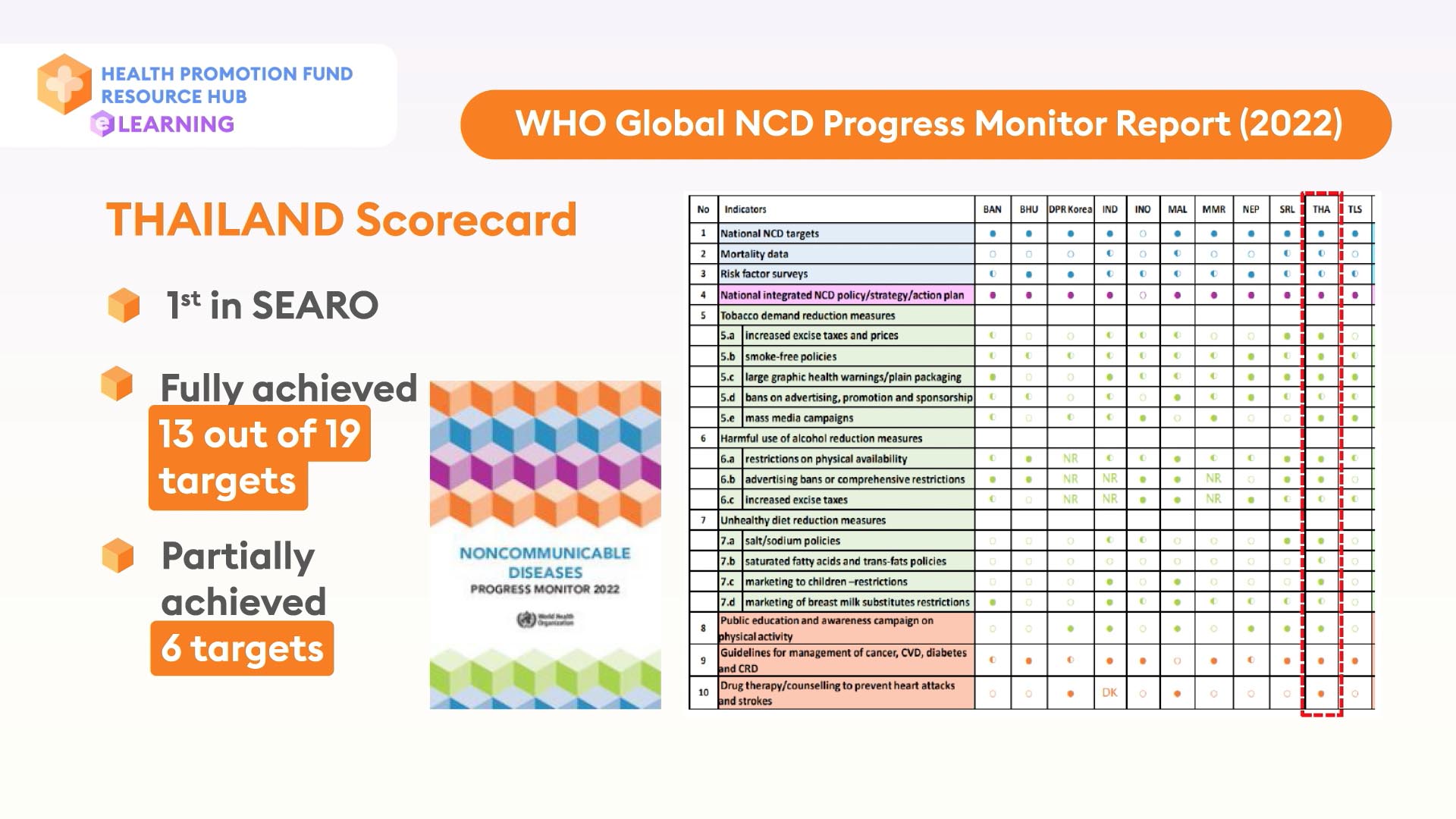
In 2021, the World Health Organization awarded ThaiHealth the Nelson Mandela Award for health promotion for its outstanding contribution to health promotion in Thailand and internationally, for its support of, the introduction of pro-health policies in Thailand, for the shift of social norms towards a more healthy and inclusive society, for its support on the propagation of innovative health financing mechanism for health promotion and multi-sectoral approach to other low-and-middle-income countries, and for its ability to react quickly to emerging needs such as the covid-19 responses, and lastly for its contribution on significant improvement of health outcomes in Thailand.
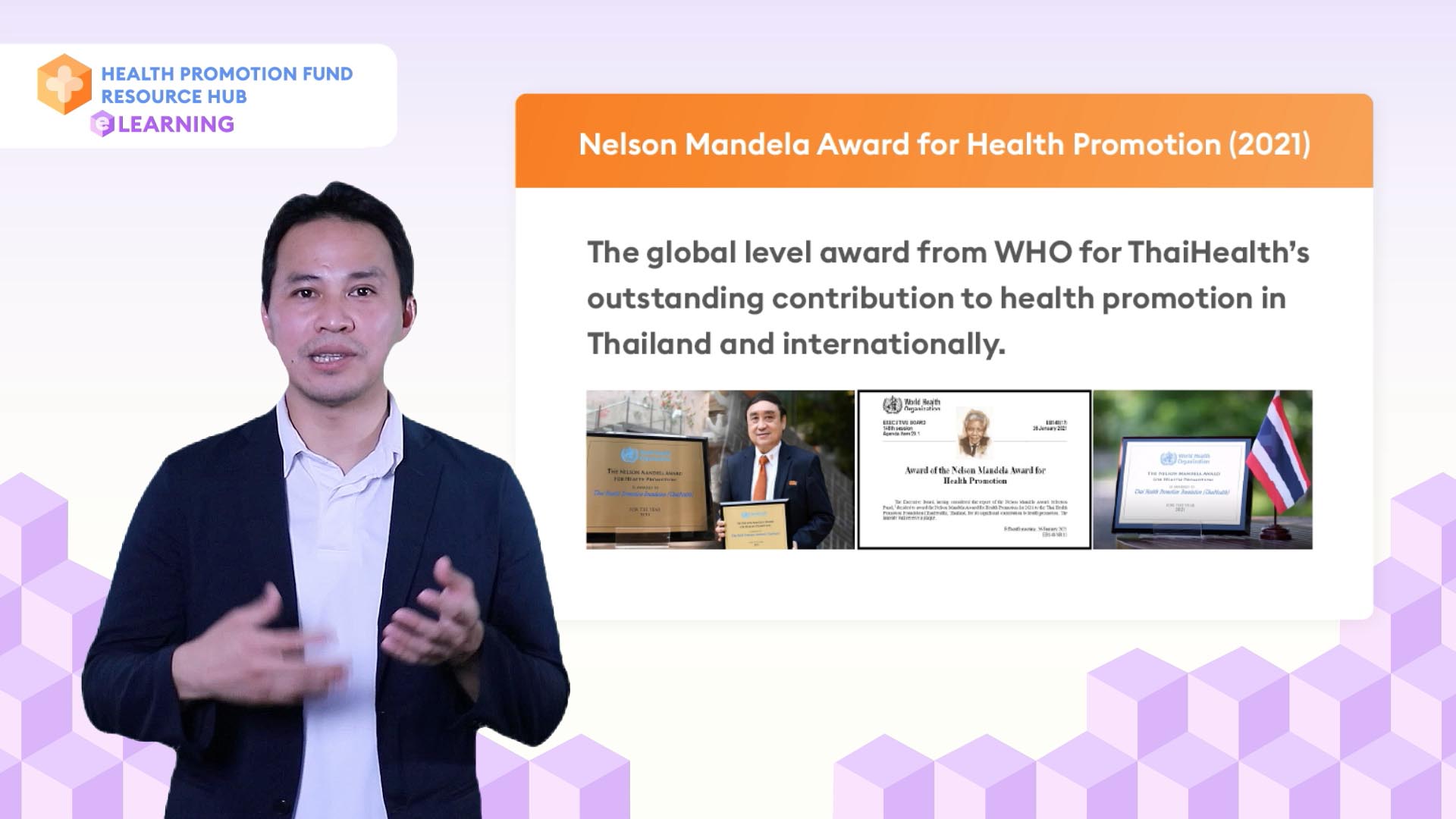
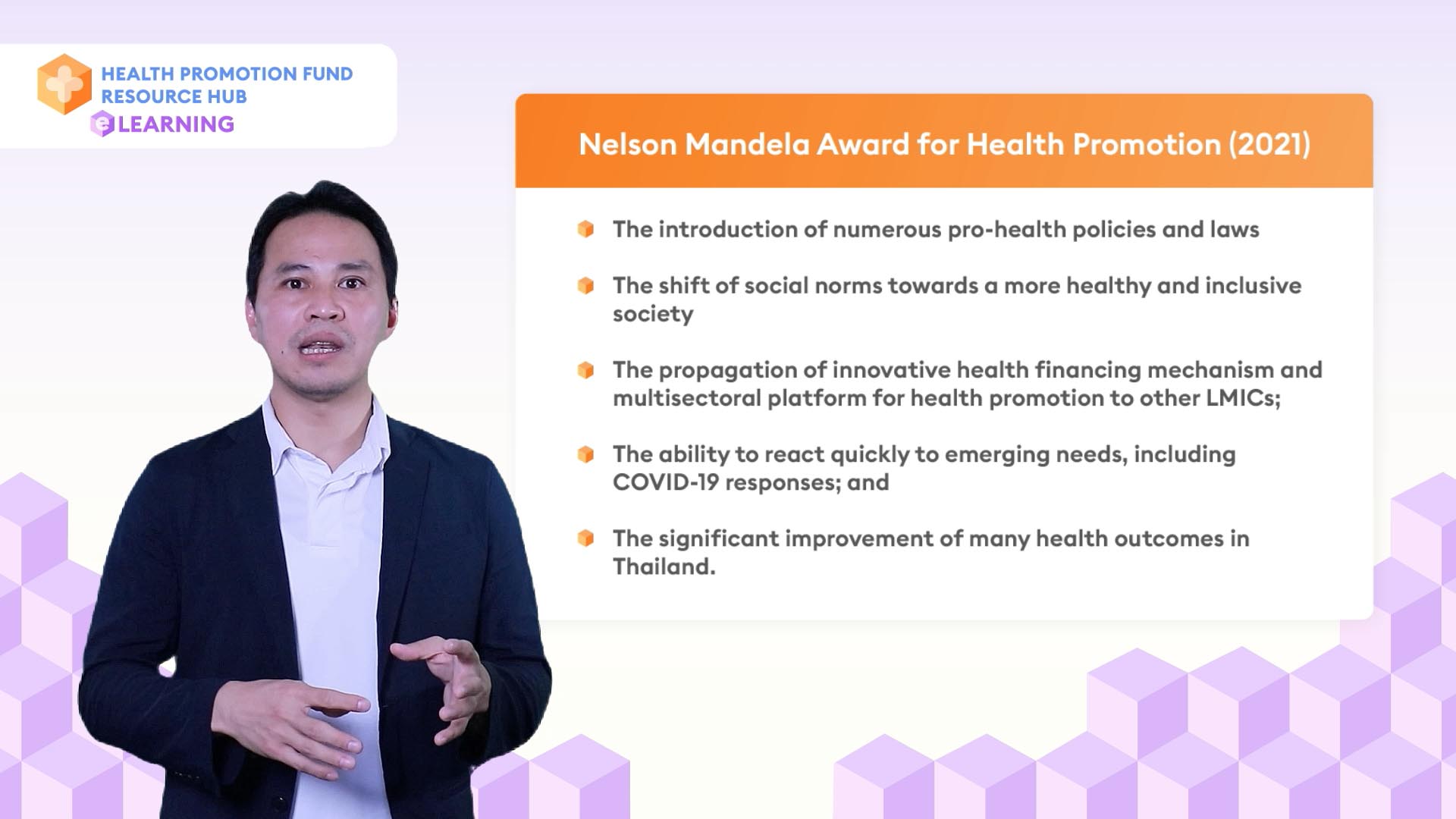
On economic evaluation, ThaiHealth has commissioned Social Return on Investment (SROI) studies on many areas of its work in 2012, it selected seven (7) areas to do social return on investment including five (5) which are micro-level and two (2) which are macro-level, which is long-term, over 10 years’ return on investment. For tobacco consumption control, USD 1 invested returns over USD 18 to society, road traffic accident prevention, every USD 1 that ThaiHealth invested in the programme has returned over USD 130 to the public.
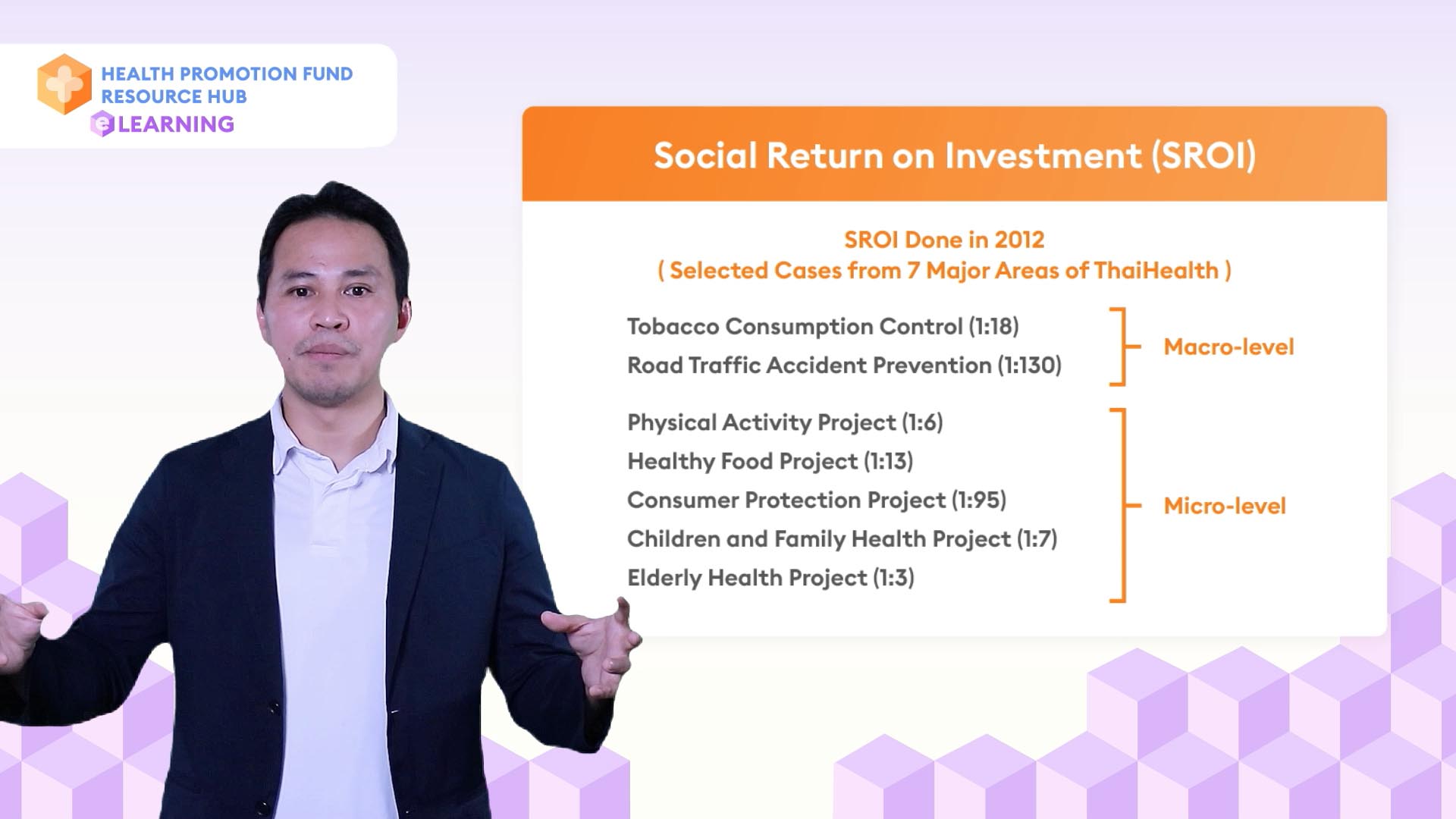
In a subsequent economic evaluation of ThaiHealth between 2012 and 2019, we have studied every investment for ThaiHealth’s operation in seven (7) areas including tobacco control, alcohol control, physical activity promotion, road safety, promotion of fruit and vegetable consumption, sweetened beverages control, and teenage pregnancy prevention. We have found that for every THB 1 invested, more than THB 3.4 of social value is created for the Thai society.
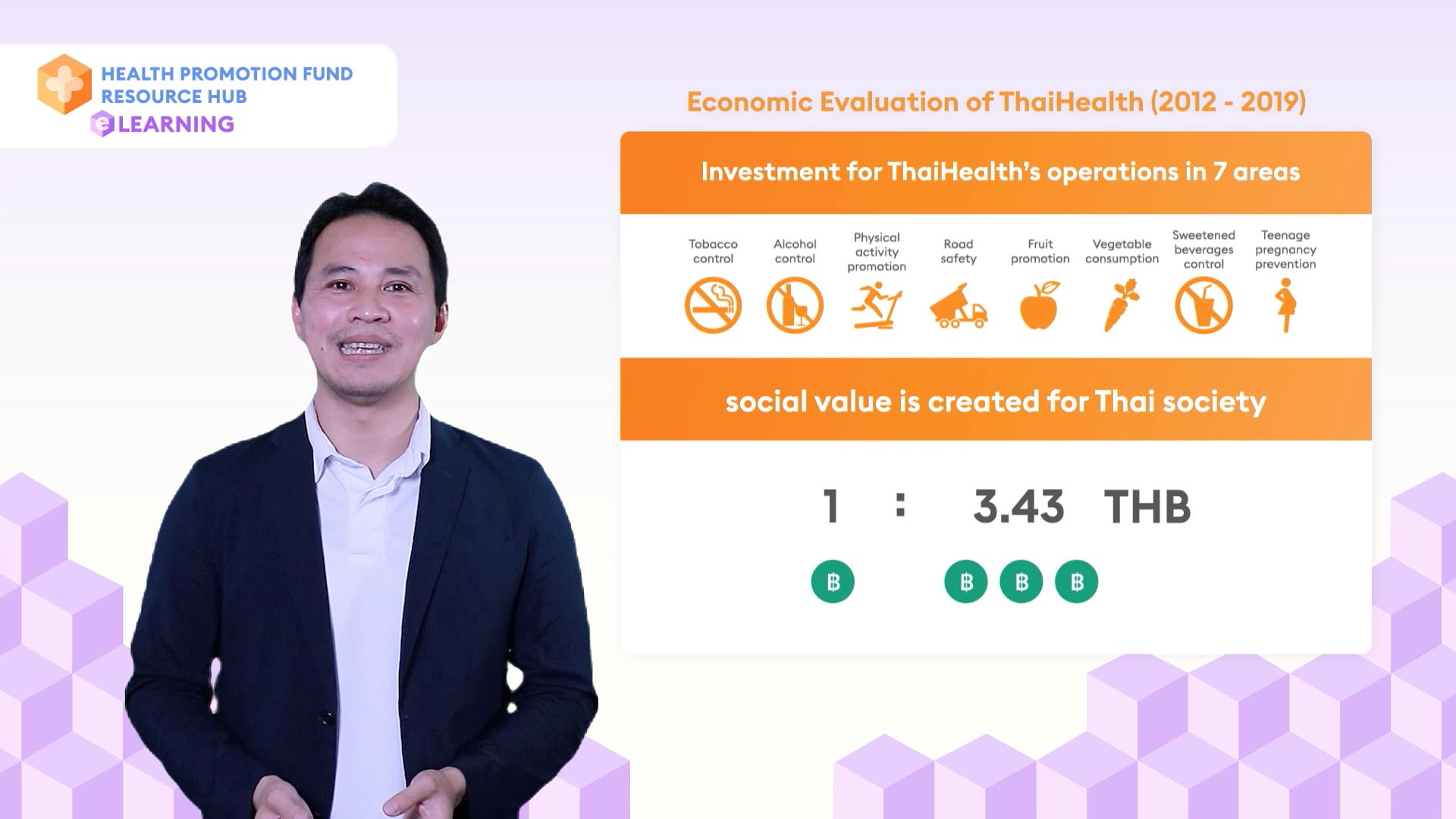
And the most recent economic evaluation is on tobacco control plans between the years 2018-2020. We found that for every THB 1 invested in the tobacco control plan, over THB 10.5 of social value is created for Thai society.
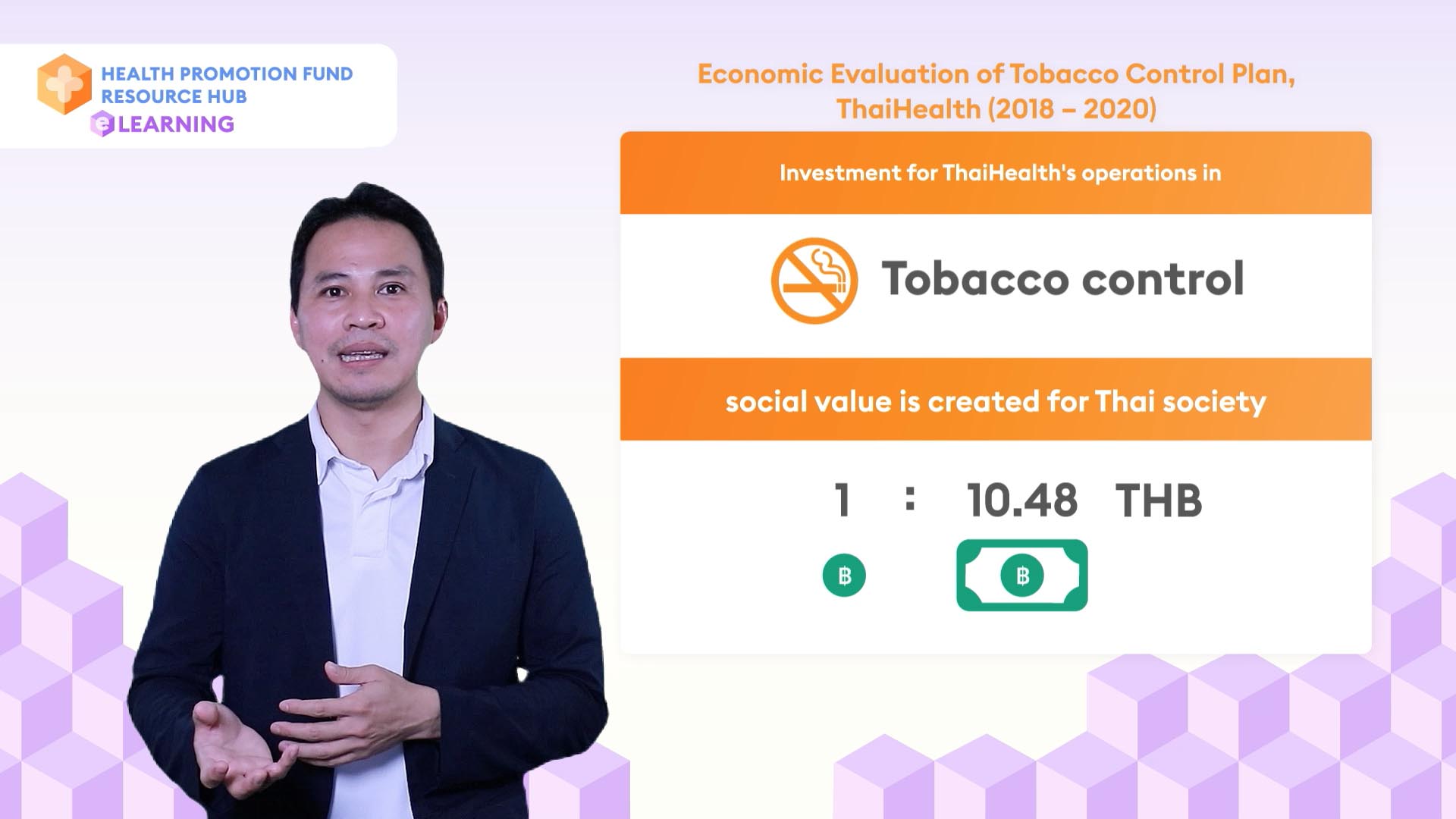
Lastly, let me summarise the key characteristics of ThaiHealth for you. The first is the innovative and sustainable funding from a 2% surcharged tax on tobacco and alcohol products which allows us to support population-based health promotion movements in Thailand. We (ThaiHealth) are an autonomous body, we operate with the government to support the government on priorities and directions on health promotion. We (ThaiHealth) have flexibility - we (ThaiHealth) can operate with less bureaucratic constraints in a transparent manner and in a quicker approach and we (ThaiHealth) have the effective Tri-Power strategy, or the ‘Triangle that Moves the Mountain’ strategy. We (ThaiHealth) work in a multi-sectoral approach where we work with all sectors of society. And lastly, we (ThaiHealth) do have the social marketing expertise to do public campaigns to prepare the social change towards good policies and behavioural change in the Thai population.
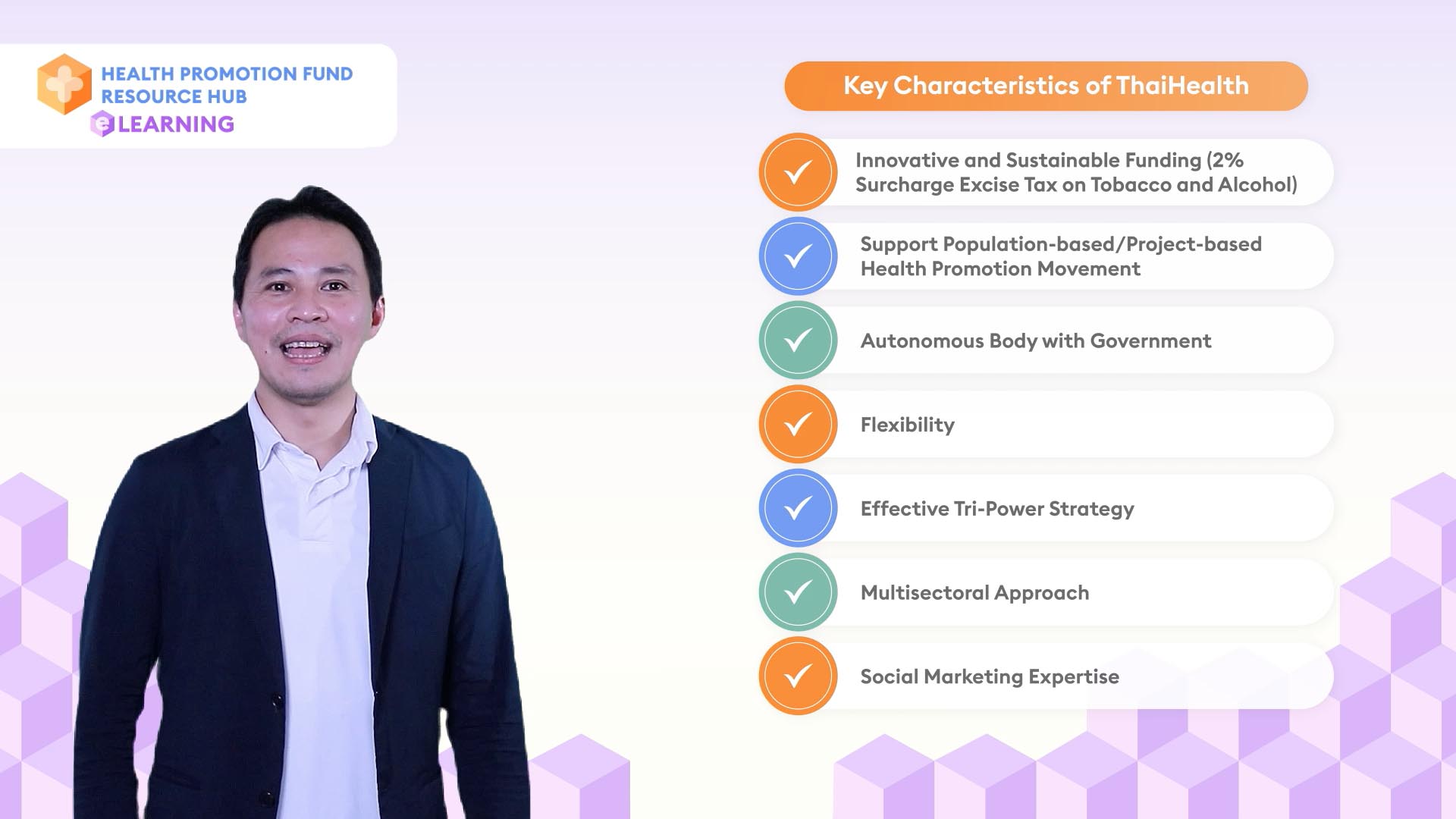
If Thailand can do it, we believe you can do it too!
